New setting to apply the :z mount option to bind volumes on SELinux
What's New in GoLand
GoLand 2023.1 introduces the vulnerability checker,
better navigation in gRPC code,
and Rename refactoring for generic receivers.
You can now run scratch files with non-standard-library packages,
use regular expressions to create your own search and replace inspections,
as well as quickly convert raw string literals to double-quoted ones and vice-versa.
The Implement interface intention action now works for unexported interfaces.
Apart from that, you will find several improvements for our new UI,
updates for Docker and Kubernetes, and improvements for web development.
If you prefer an interactive approach to learning,
we invite you to complete the
What's New in GoLand 2023.1 tutorial
from the Welcome screen.
Vulnerability checker
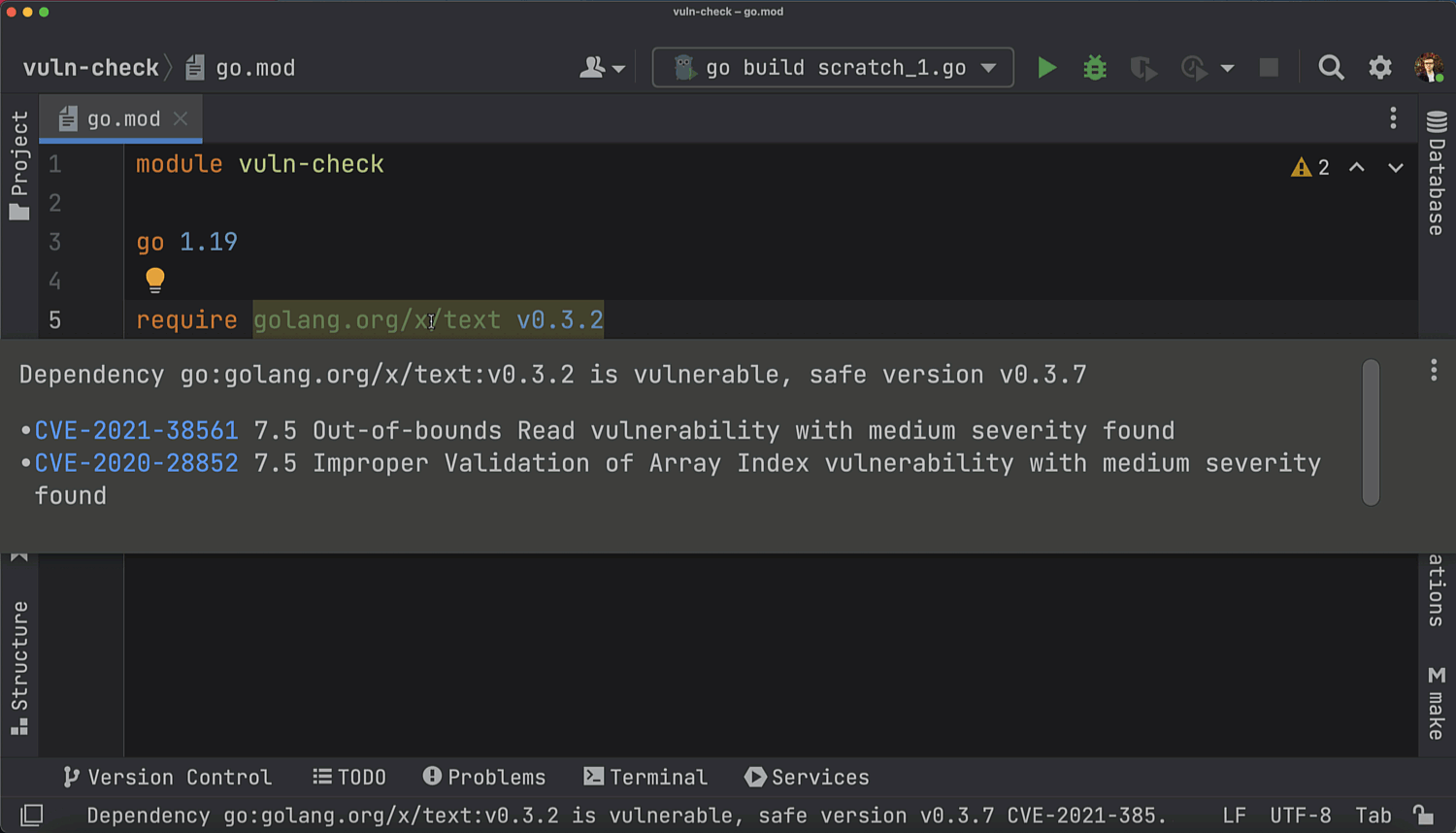 Highlight vulnerable packages
GoLand can now highlight packages with known vulnerabilities in .
Hover over the highlighted code or press Alt+Enter,
choose Show vulnerability info for …, and GoLand will show you
a list of vulnerabilities with links to the detailed description.
The data about vulnerabilities is provided
by the software security company Checkmarx.
Highlight vulnerable packages
GoLand can now highlight packages with known vulnerabilities in .
Hover over the highlighted code or press Alt+Enter,
choose Show vulnerability info for …, and GoLand will show you
a list of vulnerabilities with links to the detailed description.
The data about vulnerabilities is provided
by the software security company Checkmarx.
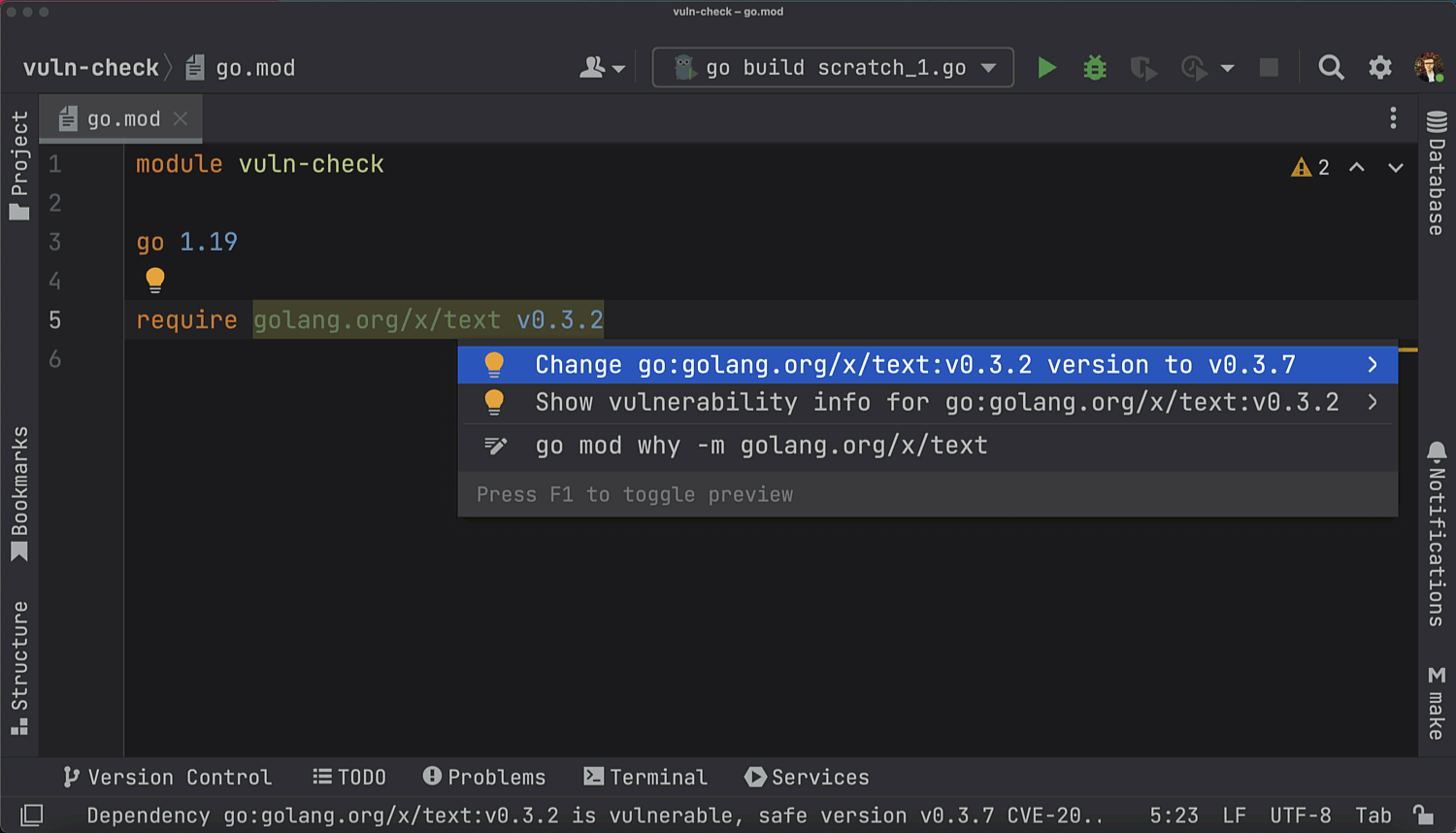 Update vulnerable packages to the secure version
You can place the cursor on a highlighted package in ,
press Alt+Enter, and choose the
Change package-name version to v0.x.x quick-fix to
update a dependency to a version that doesn't have vulnerabilities.
Update vulnerable packages to the secure version
You can place the cursor on a highlighted package in ,
press Alt+Enter, and choose the
Change package-name version to v0.x.x quick-fix to
update a dependency to a version that doesn't have vulnerabilities.
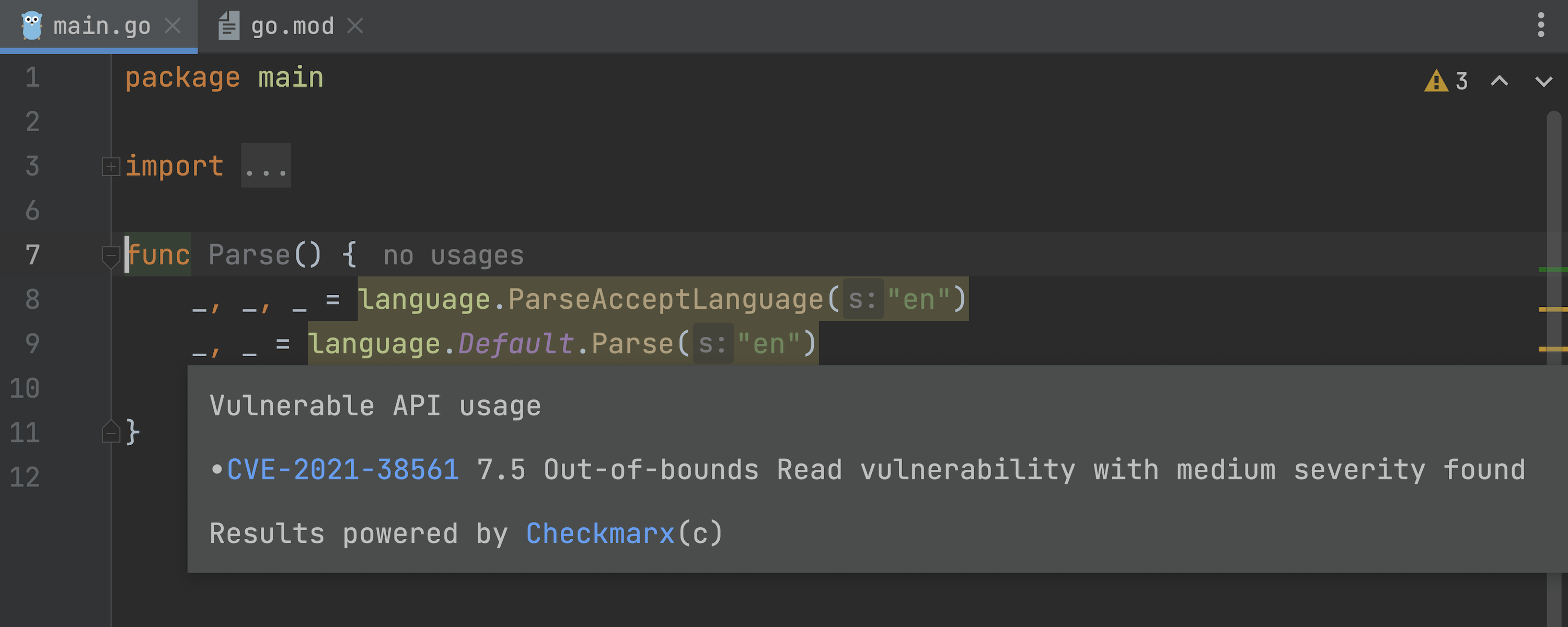 Highlight method calls from vulnerable packages
GoLand also highlights method calls from packages with known
vulnerabilities right in your editor.
You can hover over highlighted code and see a popup with
information about the vulnerability and a link to the detailed description.
Highlight method calls from vulnerable packages
GoLand also highlights method calls from packages with known
vulnerabilities right in your editor.
You can hover over highlighted code and see a popup with
information about the vulnerability and a link to the detailed description.
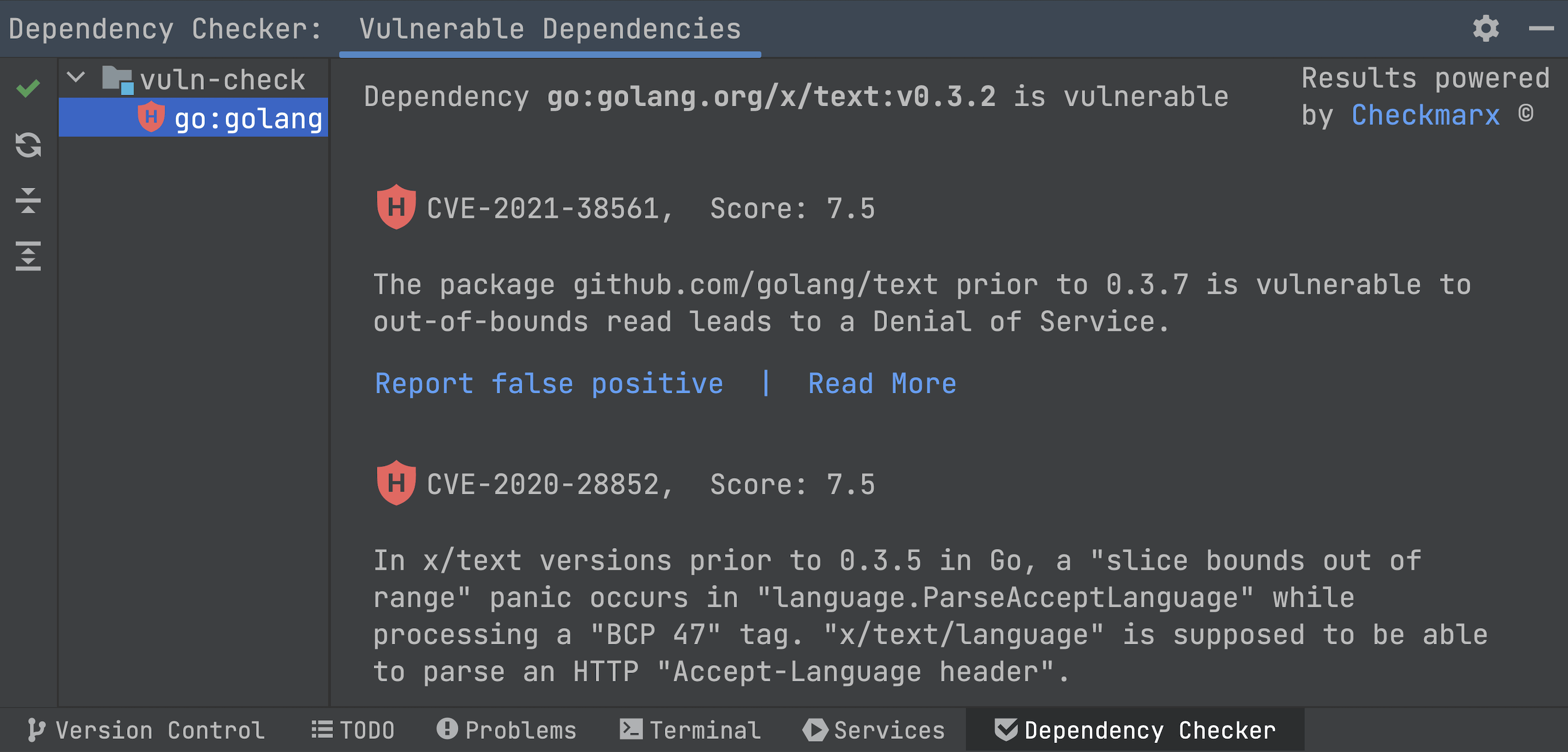 Dependency Checker tool window
You can access it via Code | Analyze Code | Show Vulnerable Dependencies.
gRPC navigation
Dependency Checker tool window
You can access it via Code | Analyze Code | Show Vulnerable Dependencies.
gRPC navigation
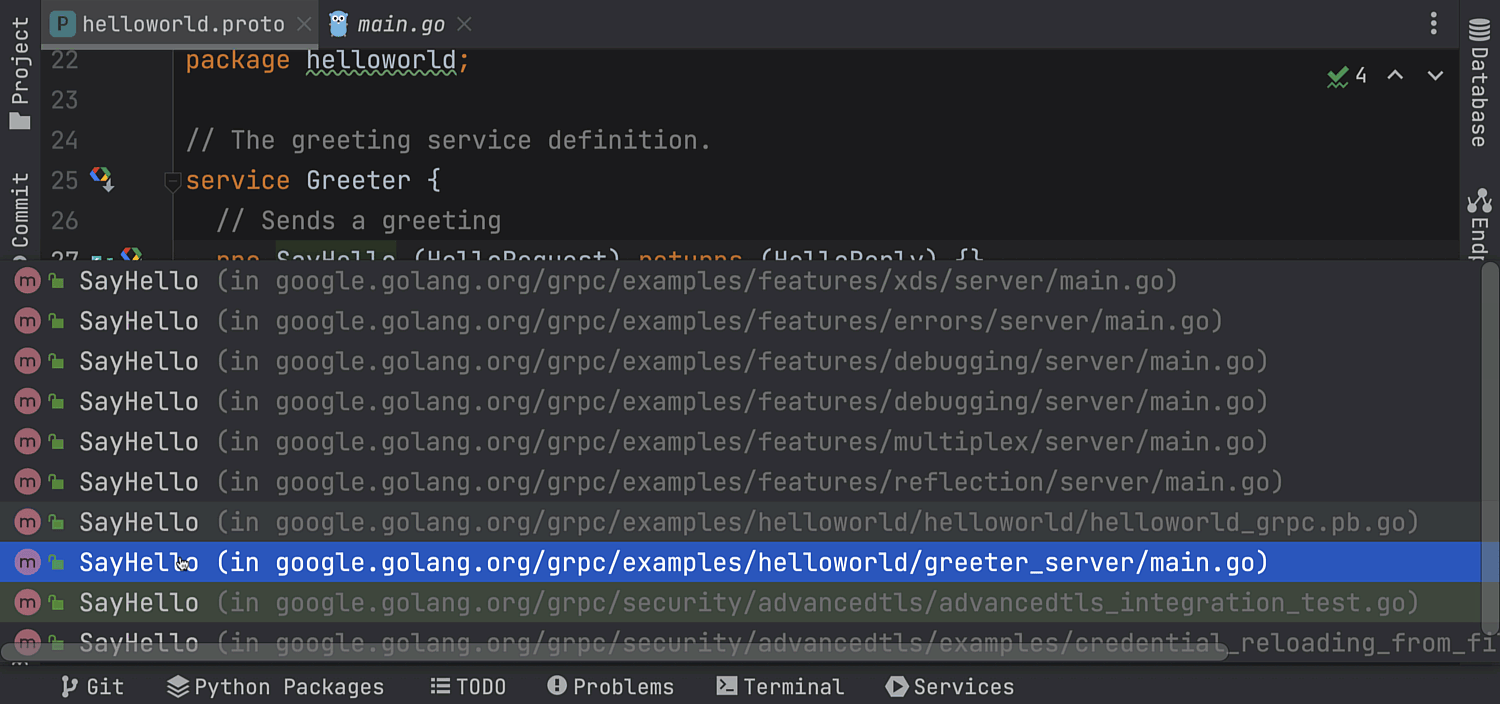 GoLand’s HTTP Client currently supports
running gRPC requests.
You can also run gRPC requests from the
Endpoints tool window.
This version offers another valuable addition to our
gRPC feature set. You can now navigate and access declarations of
messages, services, and methods from Go code and their Go implementations
from files.
For this, click the dedicated icon next to the declaration
of a message, service, method, or their implementation.
Scratch files
GoLand’s HTTP Client currently supports
running gRPC requests.
You can also run gRPC requests from the
Endpoints tool window.
This version offers another valuable addition to our
gRPC feature set. You can now navigate and access declarations of
messages, services, and methods from Go code and their Go implementations
from files.
For this, click the dedicated icon next to the declaration
of a message, service, method, or their implementation.
Scratch files
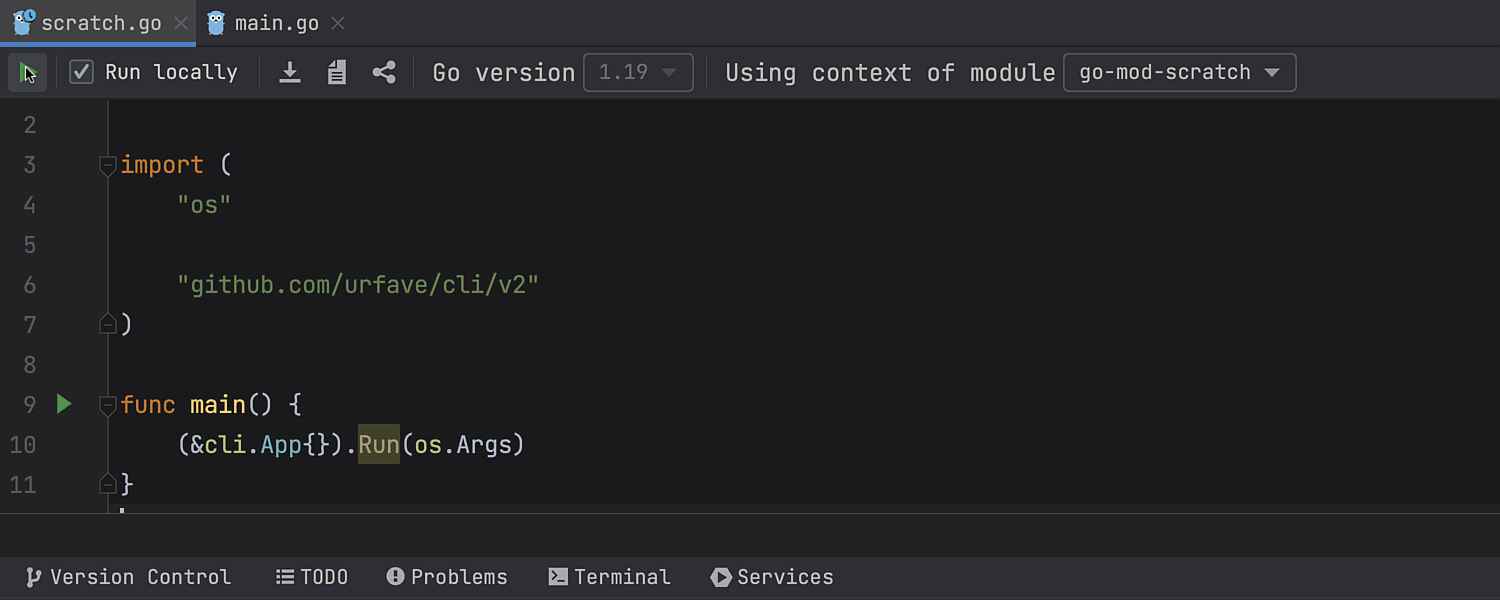 Run scratch files with non-standard-library packages
You can now run scratch files with non-standard-library Go dependencies.
When you copy your code from a project file to a scratch file
and press the Run button, GoLand creates a Run configuration
with the flag. This flag is used with a JSON file
that maps file paths to and in your original project.
Generics
Run scratch files with non-standard-library packages
You can now run scratch files with non-standard-library Go dependencies.
When you copy your code from a project file to a scratch file
and press the Run button, GoLand creates a Run configuration
with the flag. This flag is used with a JSON file
that maps file paths to and in your original project.
Generics
 Rename refactoring for generic receivers
When you rename a type parameter in a struct,
the Rename refactoring now suggests changing the receivers accordingly.
We've fixed several issues affecting navigation between interfaces,
implementations, and method specifications in generic code.
We've also implemented several additional fixes
for generics-related false positives and false negatives.
Intentions and quick-fixes
Rename refactoring for generic receivers
When you rename a type parameter in a struct,
the Rename refactoring now suggests changing the receivers accordingly.
We've fixed several issues affecting navigation between interfaces,
implementations, and method specifications in generic code.
We've also implemented several additional fixes
for generics-related false positives and false negatives.
Intentions and quick-fixes
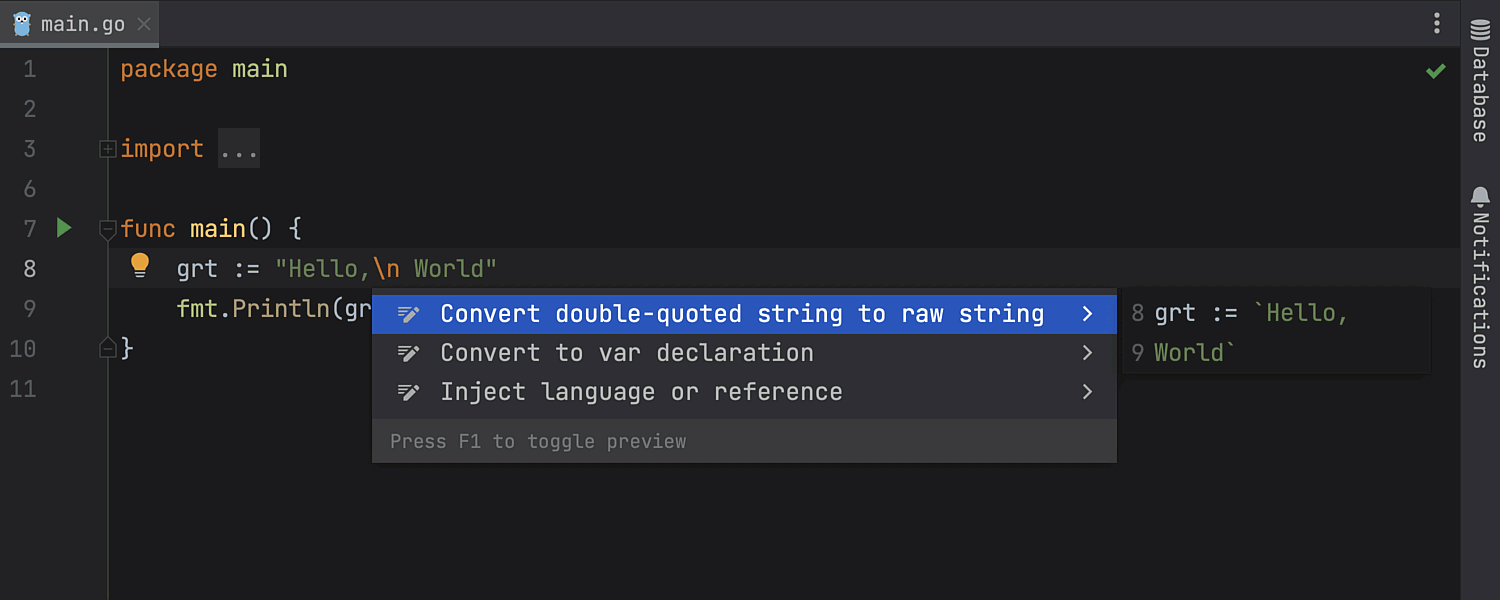 Conversion between different kinds of string literals
Now, there is an intention action that lets you quickly
convert raw string literals – strings that are surrounded by backticks
– to double-quoted ones and vice-versa.
Conversion between different kinds of string literals
Now, there is an intention action that lets you quickly
convert raw string literals – strings that are surrounded by backticks
– to double-quoted ones and vice-versa.
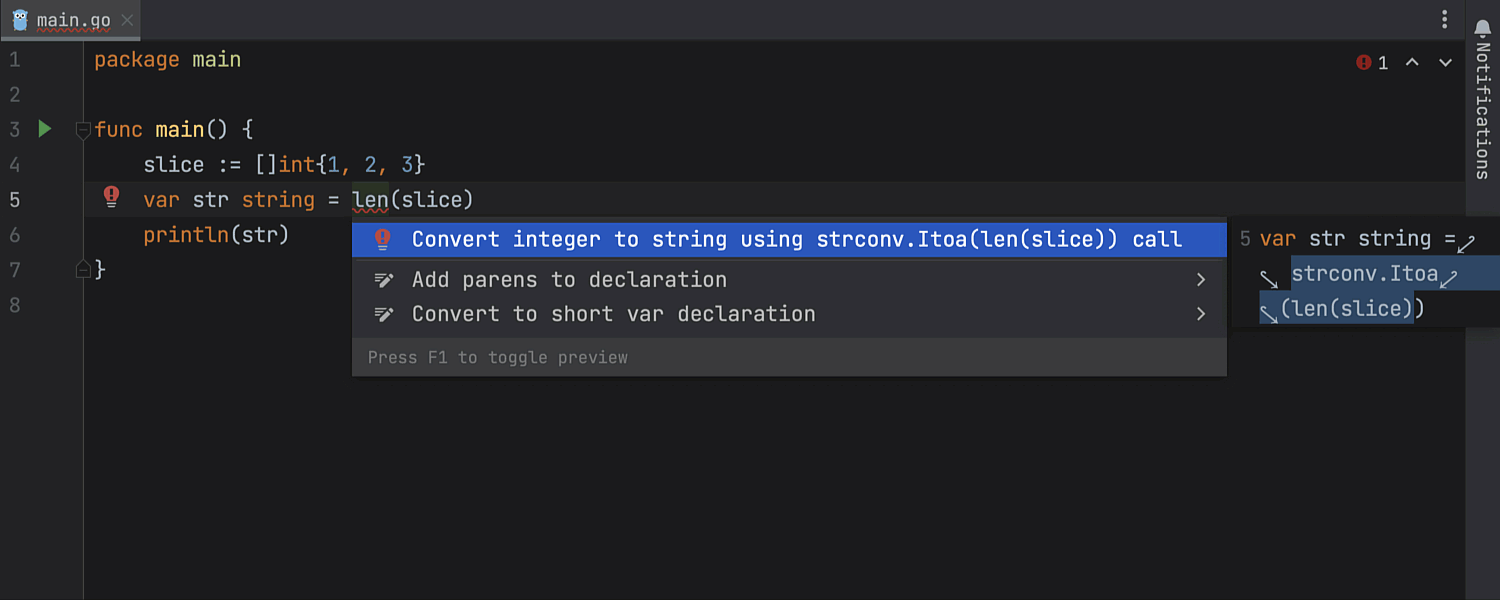 Simplified conversion of integers to strings
Previously, when you needed to convert an integer to a string,
GoLand would first suggest the Convert to ‘string’ quick-fix.
To complete the conversion correctly, you would then need another quick-fix
– Convert integer to string using strconv.Itoa() call.
We’ve simplified this workflow, and now GoLand suggests the
Convert integer to string using strconv.Itoa() call quick-fix right away.
Simplified conversion of integers to strings
Previously, when you needed to convert an integer to a string,
GoLand would first suggest the Convert to ‘string’ quick-fix.
To complete the conversion correctly, you would then need another quick-fix
– Convert integer to string using strconv.Itoa() call.
We’ve simplified this workflow, and now GoLand suggests the
Convert integer to string using strconv.Itoa() call quick-fix right away.
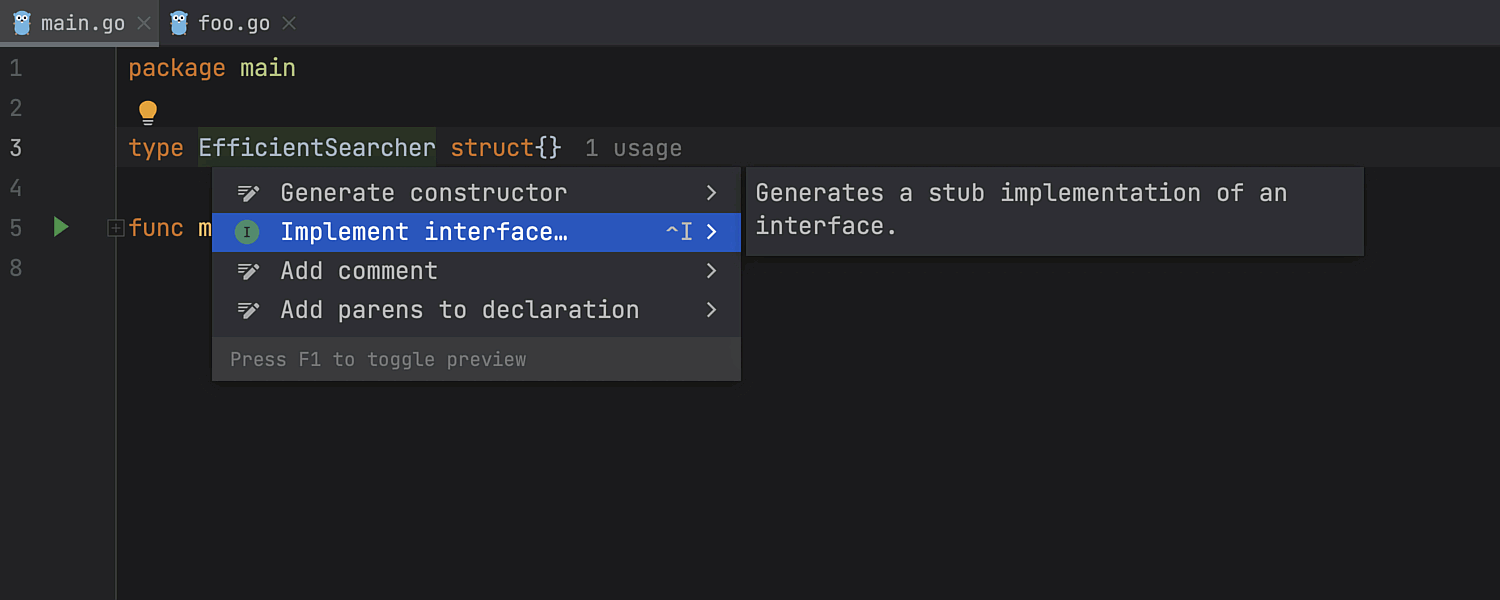 Ability to implement unexported interfaces
The Implement interface intention action now works for unexported interfaces.
Ability to implement unexported interfaces
The Implement interface intention action now works for unexported interfaces.
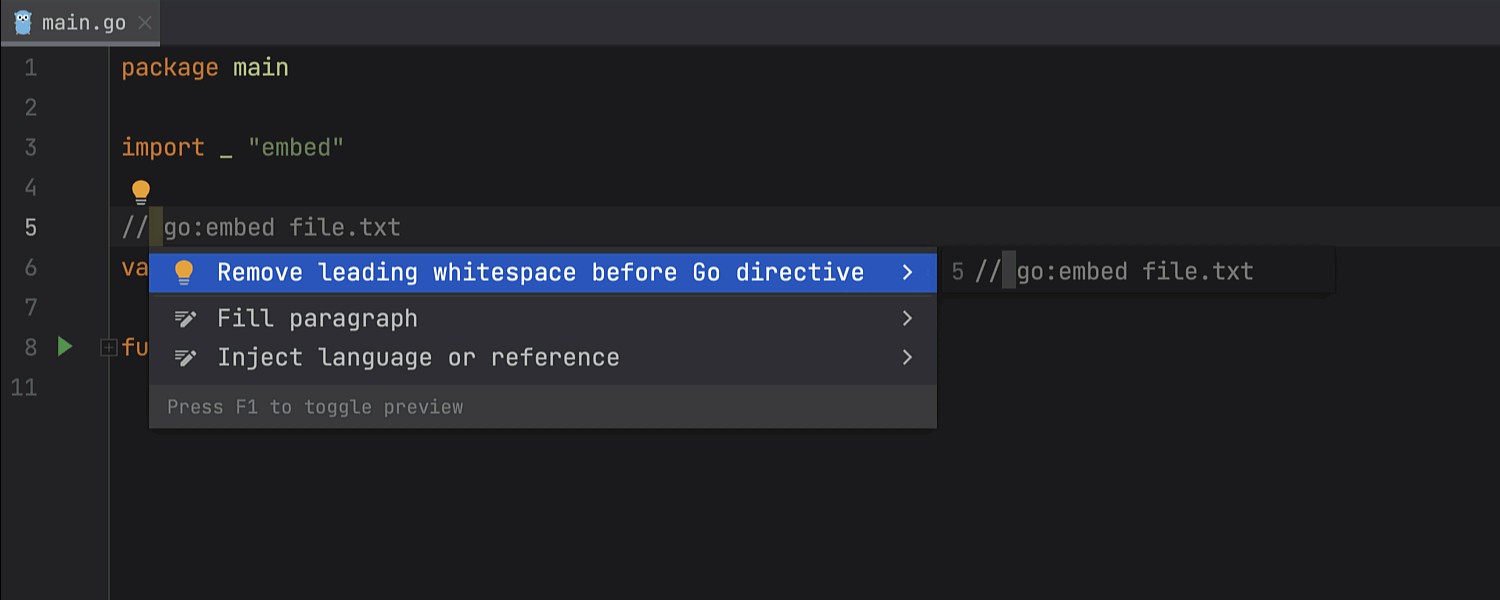 Remove leading spaces from Go directives
GoLand now has an inspection and a quick-fix that will help you to
detect and remove leading spaces in Go directives like .
Remove leading spaces from Go directives
GoLand now has an inspection and a quick-fix that will help you to
detect and remove leading spaces in Go directives like .
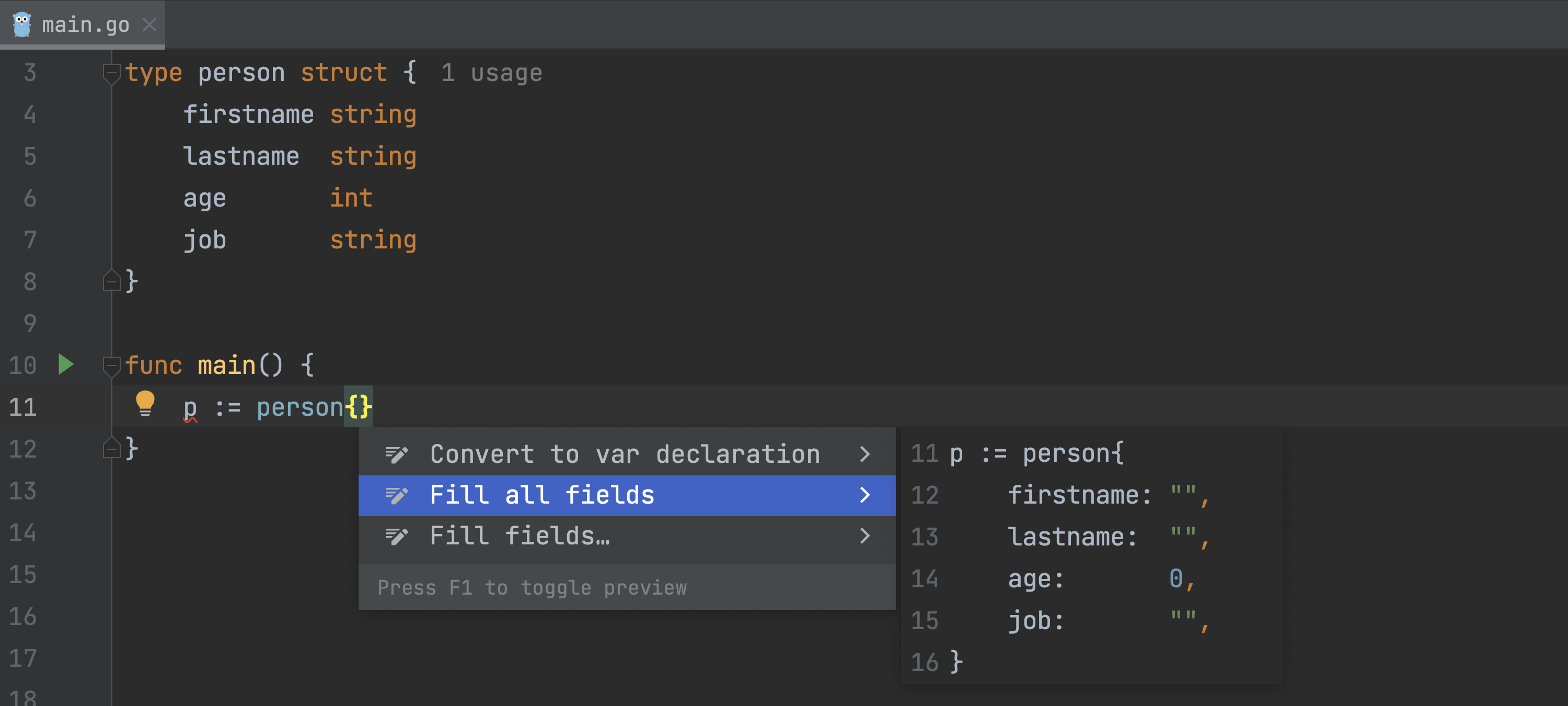 Intention Preview: More supported intentions and quick-fixes
In the previous release, we enabled the Intention Preview
functionality by default.
This feature lets you instantly
see how your code will be altered once you apply the IDE’s suggestions.
It is now possible to preview a broader range of intention actions and quick-fixes:
Introduce local variable, Create variable/global variable, Create constant/global constant,
Create field, Merge declaration up, Delete all unused parameters, Create function,
Create method, Fill all fields.
Performance improvements
Scanning files to index in smart mode
We’ve improved the IDE startup experience by performing
the Scanning files to index… process in smart mode,
which makes the IDE’s full range of functionality available
much earlier in the startup process. When opening a project,
GoLand uses existing caches from your previous session with
the project and simultaneously looks for files to index.
If no changes are found in the scan, the IDE will be fully
ready for you to work, eliminating the delays that were
previously caused by indexing on startup.
Suggestion to reconfigure Windows Defender settings
There’s a new notification triggered when Windows Defender with
Real-Time Protection is running. Given that these antivirus checks
can significantly decrease the IDE speed, GoLand suggests adding
specific folders to Defender’s list of exclusions. The notification
provides options to either reconfigure these settings automatically
or first check the Defender configuration instructions and do it manually.
Editor
Intention Preview: More supported intentions and quick-fixes
In the previous release, we enabled the Intention Preview
functionality by default.
This feature lets you instantly
see how your code will be altered once you apply the IDE’s suggestions.
It is now possible to preview a broader range of intention actions and quick-fixes:
Introduce local variable, Create variable/global variable, Create constant/global constant,
Create field, Merge declaration up, Delete all unused parameters, Create function,
Create method, Fill all fields.
Performance improvements
Scanning files to index in smart mode
We’ve improved the IDE startup experience by performing
the Scanning files to index… process in smart mode,
which makes the IDE’s full range of functionality available
much earlier in the startup process. When opening a project,
GoLand uses existing caches from your previous session with
the project and simultaneously looks for files to index.
If no changes are found in the scan, the IDE will be fully
ready for you to work, eliminating the delays that were
previously caused by indexing on startup.
Suggestion to reconfigure Windows Defender settings
There’s a new notification triggered when Windows Defender with
Real-Time Protection is running. Given that these antivirus checks
can significantly decrease the IDE speed, GoLand suggests adding
specific folders to Defender’s list of exclusions. The notification
provides options to either reconfigure these settings automatically
or first check the Defender configuration instructions and do it manually.
Editor
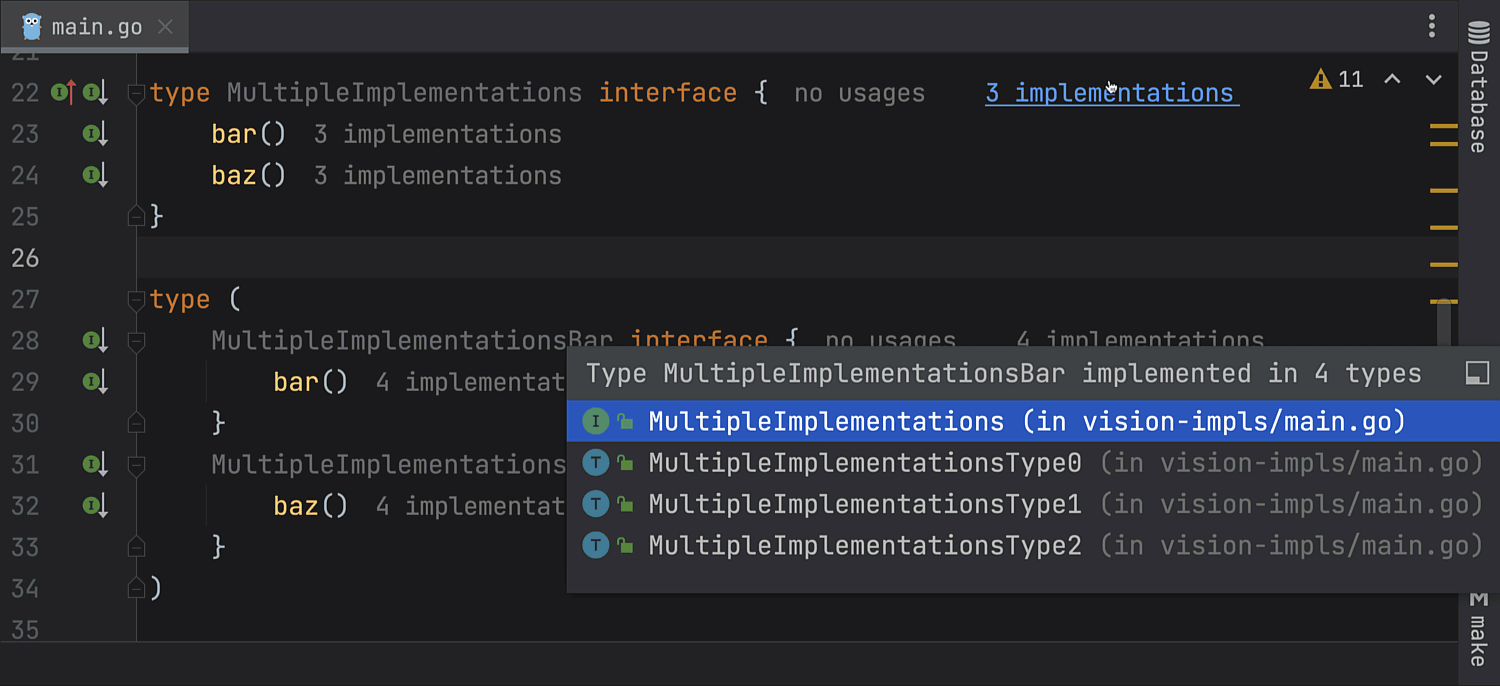 Code Vision: Interfaces implementations
We’ve updated the Code Vision feature. GoLand now shows the number
of implementations for an interface and its method specifications.
In the previous version, we introduced usages displayed near all
functions and types showing how often the function or type is
referenced in the current project. Also, the code authors are displayed
if version control integration is enabled.
Code Vision: Interfaces implementations
We’ve updated the Code Vision feature. GoLand now shows the number
of implementations for an interface and its method specifications.
In the previous version, we introduced usages displayed near all
functions and types showing how often the function or type is
referenced in the current project. Also, the code authors are displayed
if version control integration is enabled.
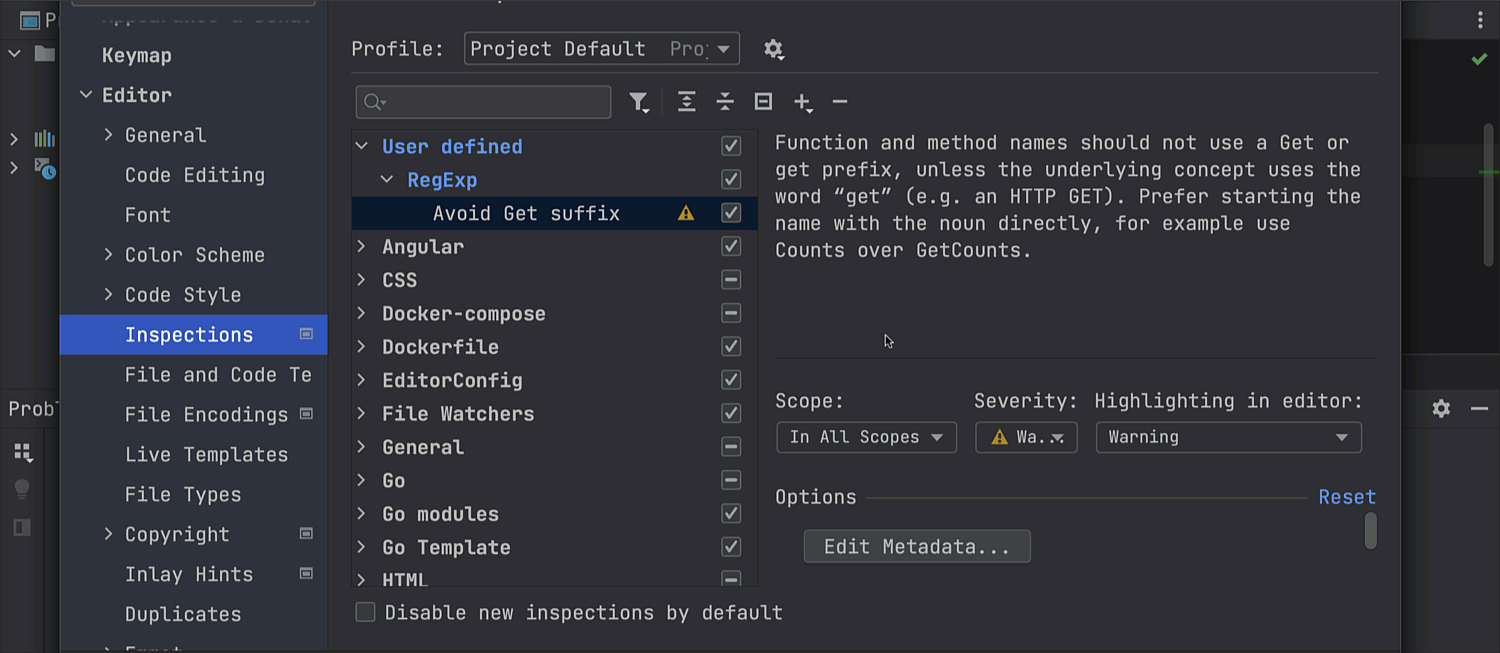 Custom RegExp-based inspections
You can now use regular expressions to create your own search
and replace inspections. These inspections can be especially
useful for highlighting style-based or formatting-based problems.
Go to Settings
| Editor | Inspections and press the + icon.
Select Add RegExp Search Inspection from the list, and you’ll
be directed to a dialog where you can set up your new inspection.
Select the desired language, use hints from the panel on the left
to build a RegExp, and designate the required replacement. You can
also specify how you want the IDE to highlight them in the project.
Custom RegExp-based inspections
You can now use regular expressions to create your own search
and replace inspections. These inspections can be especially
useful for highlighting style-based or formatting-based problems.
Go to Settings
| Editor | Inspections and press the + icon.
Select Add RegExp Search Inspection from the list, and you’ll
be directed to a dialog where you can set up your new inspection.
Select the desired language, use hints from the panel on the left
to build a RegExp, and designate the required replacement. You can
also specify how you want the IDE to highlight them in the project.
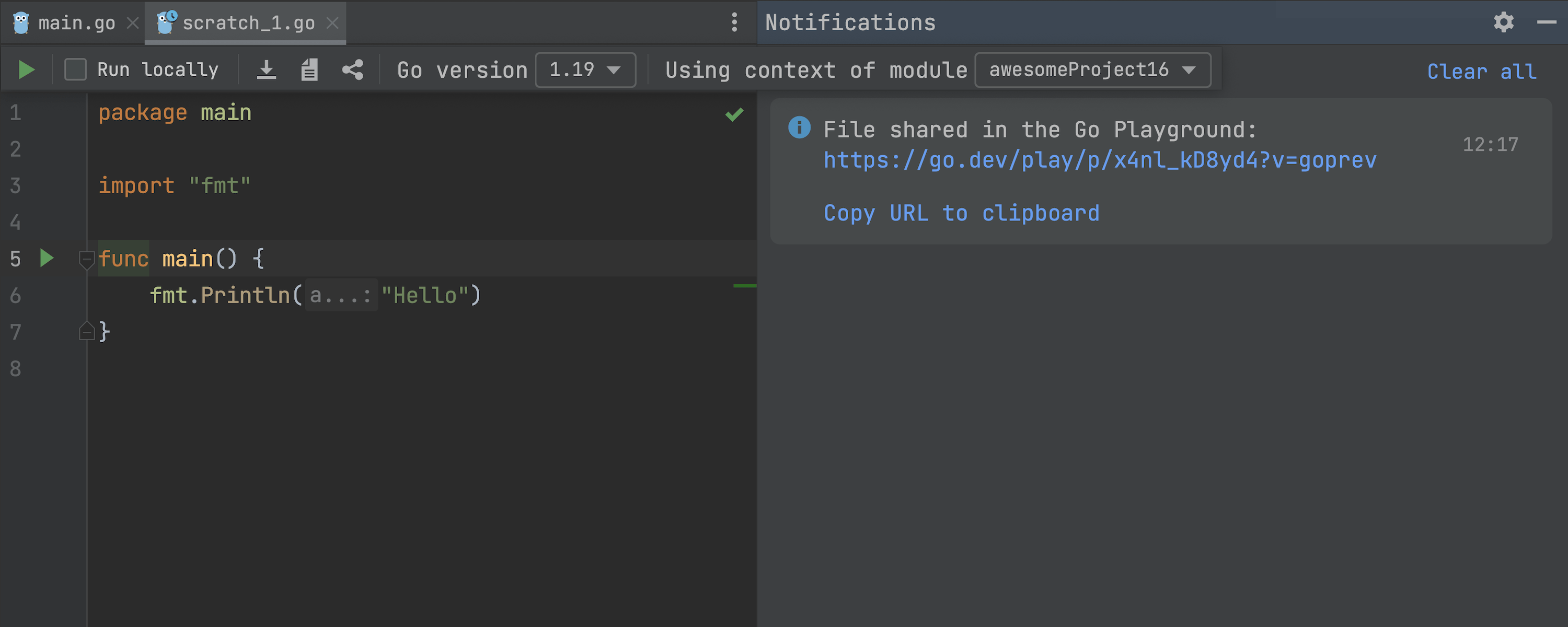 Go Playground: Version parameter in shared URL
In the 2022.3 version, we integrated the Go Playground functionality into GoLand.
In this version, we’ve improved that feature.
First of all, shared URLs now include the version
parameter if you choose the dev or previous versions.
We’ve also added an option to turn off the popup window
that asks your permission to share code in the Playground.
You can disable it in
Settings
| Go | Ask before sharing in Go Playground.
Go Playground: Version parameter in shared URL
In the 2022.3 version, we integrated the Go Playground functionality into GoLand.
In this version, we’ve improved that feature.
First of all, shared URLs now include the version
parameter if you choose the dev or previous versions.
We’ve also added an option to turn off the popup window
that asks your permission to share code in the Playground.
You can disable it in
Settings
| Go | Ask before sharing in Go Playground.
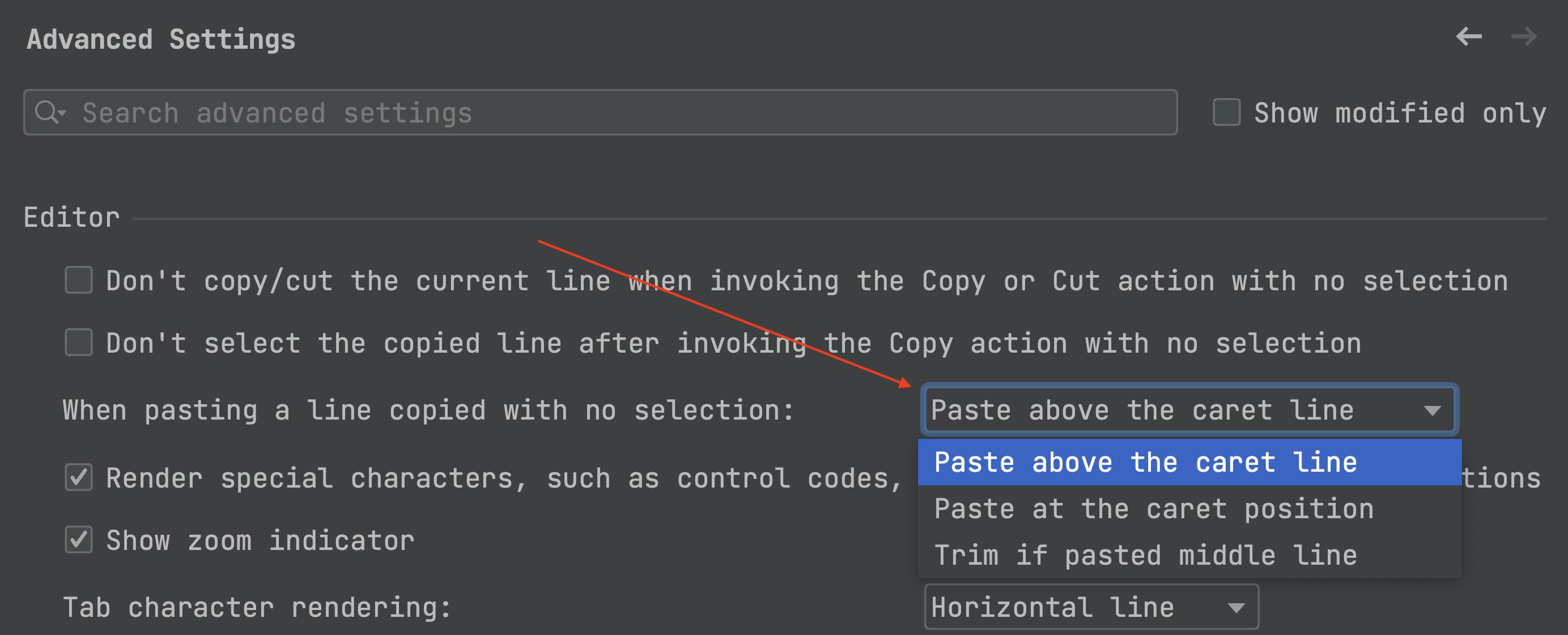 Option to specify the placement of pasted content
We’ve fine-tuned the user experience when pasting a
line that was copied or cut without selection.
There’s now a special setting that allows you to control the placement of the pasted content.
In Settings
| Advanced Settings, find the Editor section and
select the desired behavior for the Paste action from the drop-down list.
Option to specify the placement of pasted content
We’ve fine-tuned the user experience when pasting a
line that was copied or cut without selection.
There’s now a special setting that allows you to control the placement of the pasted content.
In Settings
| Advanced Settings, find the Editor section and
select the desired behavior for the Paste action from the drop-down list.
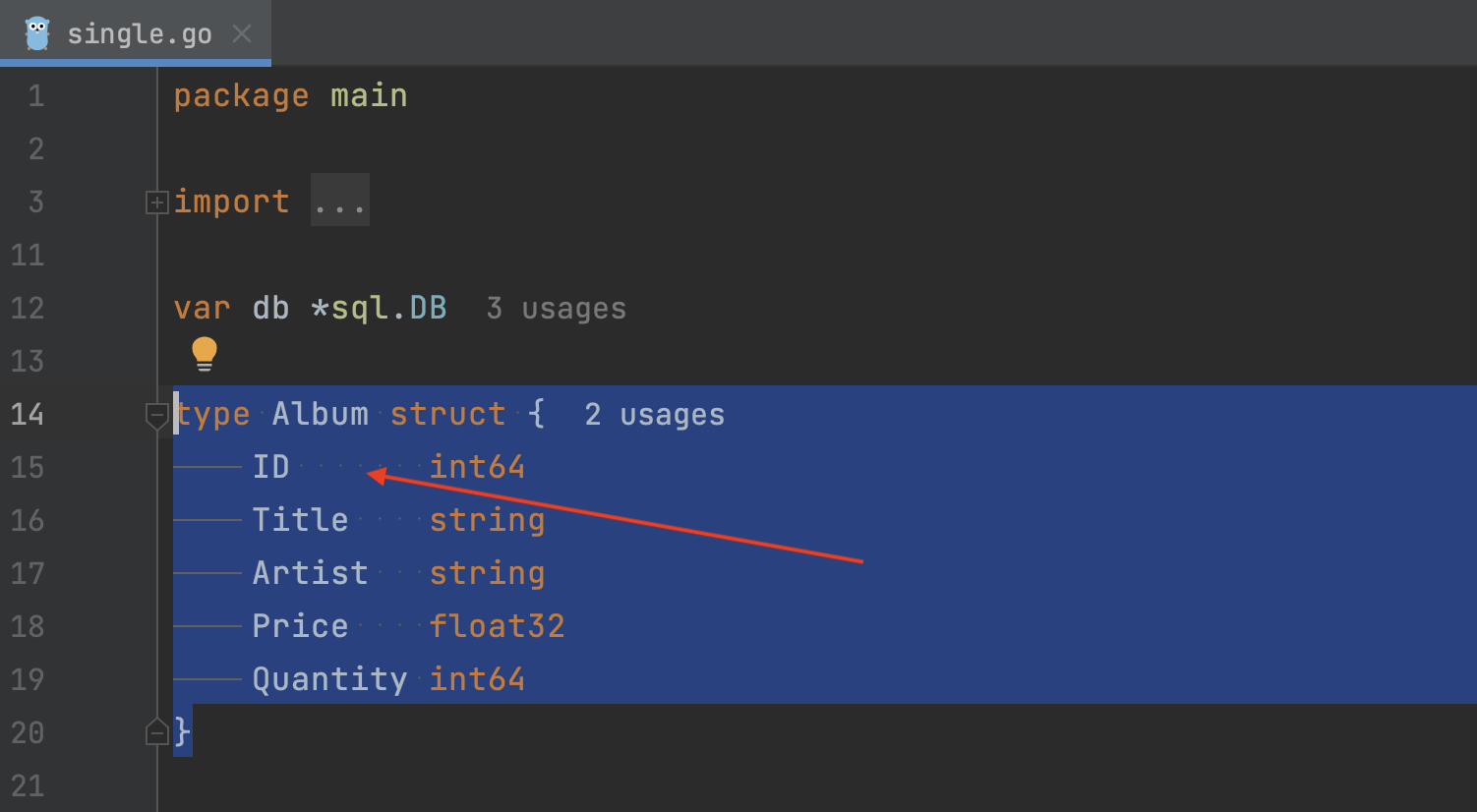 Option to show whitespaces only in selected code
There’s a new Selection checkbox in Settings
| Editor | General |
Appearance | Show Whitespace that allows you to configure this
setting so that the IDE shows whitespaces as small dots only when you select code.
Option to show whitespaces only in selected code
There’s a new Selection checkbox in Settings
| Editor | General |
Appearance | Show Whitespace that allows you to configure this
setting so that the IDE shows whitespaces as small dots only when you select code.
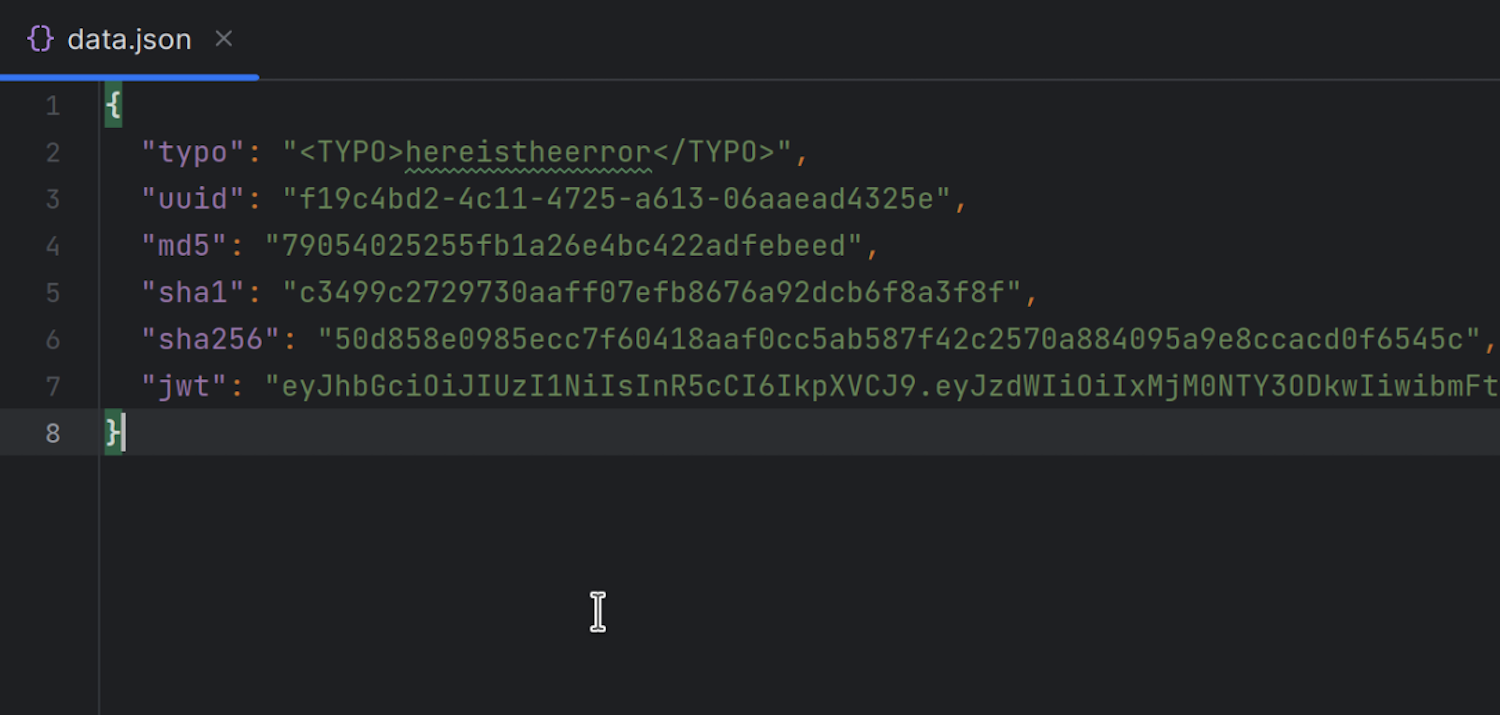 No spell checks for hashes and special values
We’ve updated the Typo inspection so that it no longer checks the spelling of hashes and special values and doesn’t report them as misspelled. This update covers the following values:
Md5, Sha1, and Sha256 hex values.
Sha384 and Sha512 base64-encoded integrity values with the shaNNN– prefix.
JWT tokens.
No spell checks for hashes and special values
We’ve updated the Typo inspection so that it no longer checks the spelling of hashes and special values and doesn’t report them as misspelled. This update covers the following values:
Md5, Sha1, and Sha256 hex values.
Sha384 and Sha512 base64-encoded integrity values with the shaNNN– prefix.
JWT tokens.
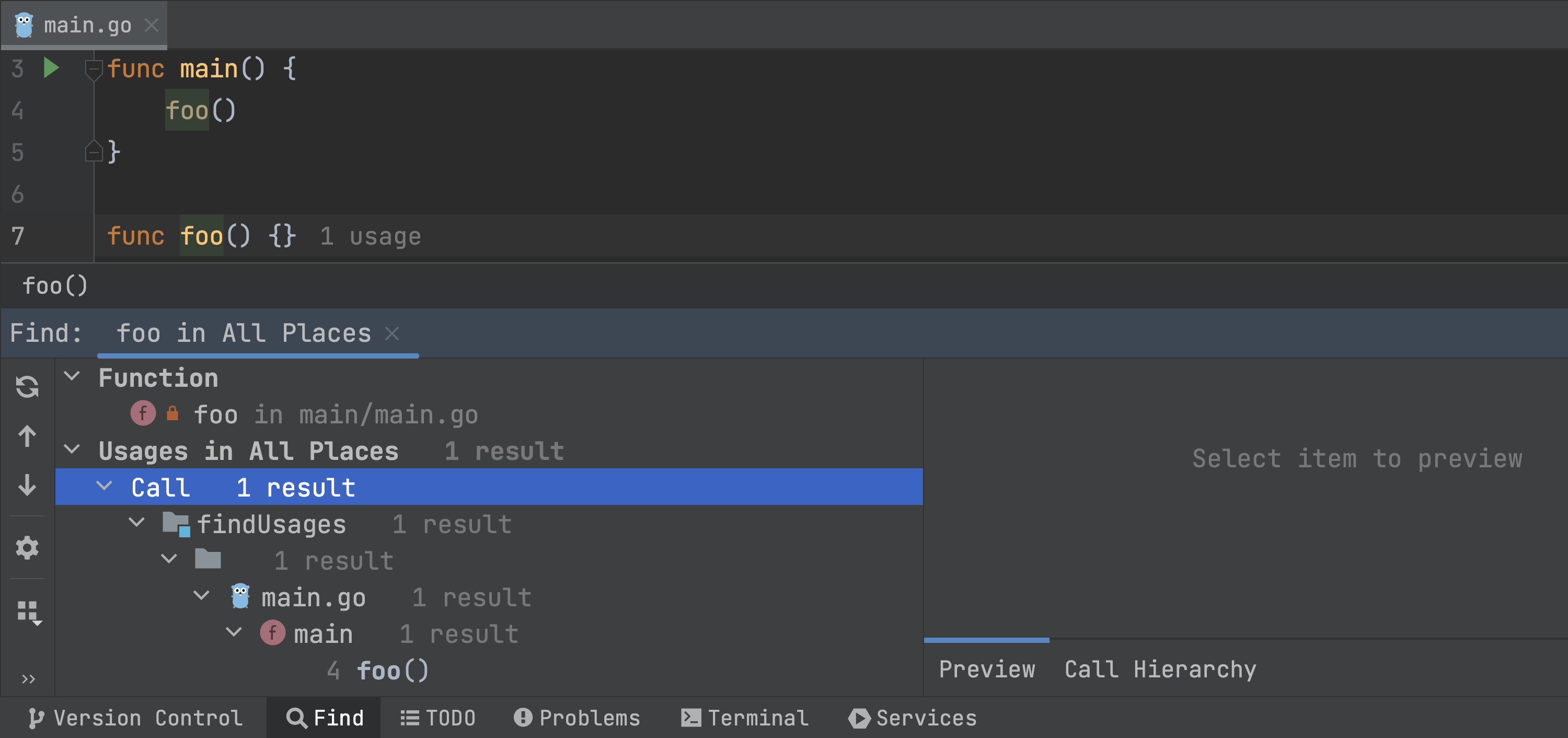 The new
Call group in Find Usages
We’ve introduced a new Find Usages group for function calls – the Call group.
We’ve also implemented some fixes for how generic code
element usage is represented in the Find Usages window.
User experience
The new
Call group in Find Usages
We’ve introduced a new Find Usages group for function calls – the Call group.
We’ve also implemented some fixes for how generic code
element usage is represented in the Find Usages window.
User experience
 Full IDE zoom
It’s now possible to zoom into and out of GoLand entirely,
increasing or decreasing the size of all UI elements at once.
From the main menu, select View | Appearance |
Switch Zoom IDE and adjust the IDE’s scaling.
Full IDE zoom
It’s now possible to zoom into and out of GoLand entirely,
increasing or decreasing the size of all UI elements at once.
From the main menu, select View | Appearance |
Switch Zoom IDE and adjust the IDE’s scaling.
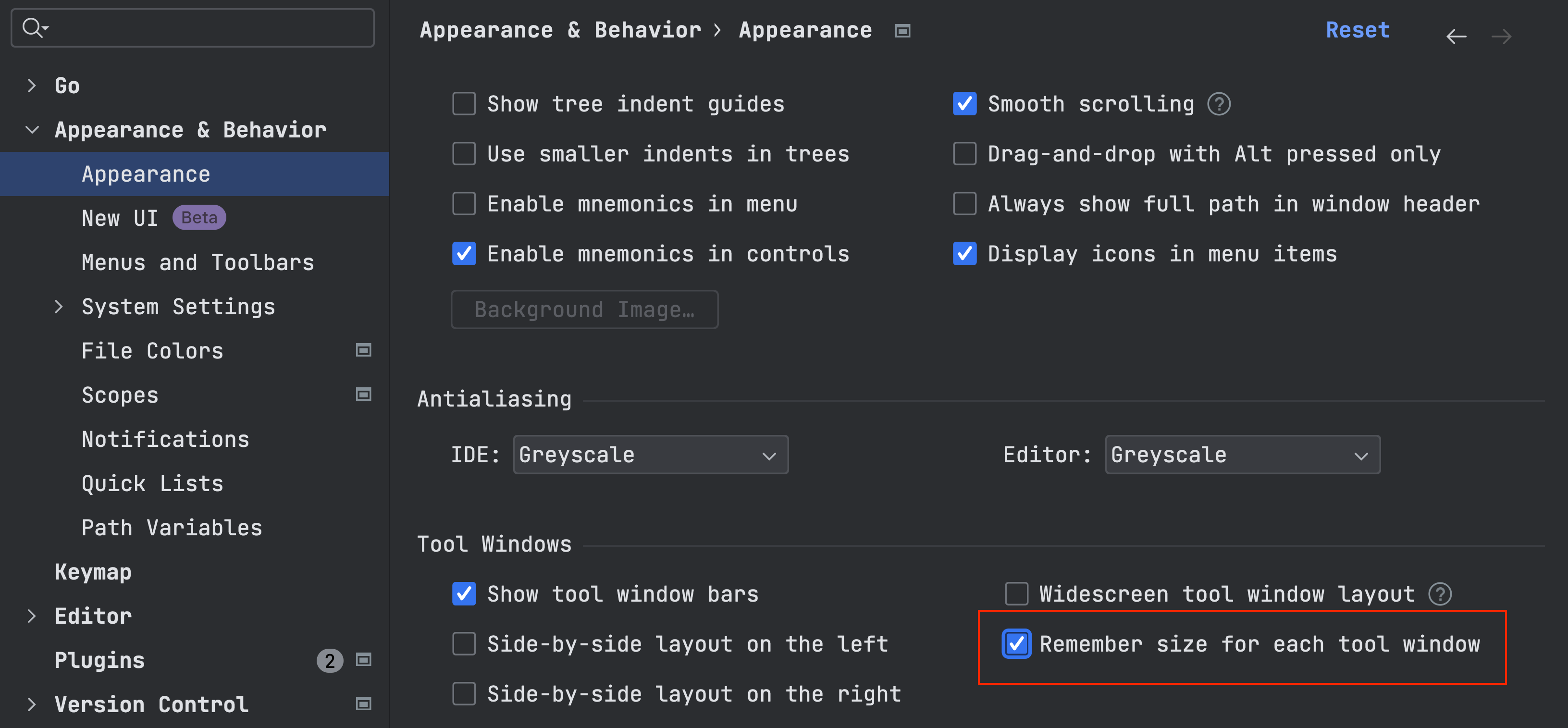 New Remember size for each tool window setting
We’ve introduced a new layout option that allows you to unify the width
of the side tool windows or retain the ability to freely adjust their
sizes as you customize your layout. The new Remember size for each tool
window checkbox is available in Settings
| Appearance | Appearance & Behavior | Tool Windows.
In the new UI, the setting is switched off by default,
meaning that the tool windows are displayed with a unified width,
and their sizes remain constant when you switch between them.
In the old UI, the option is switched on, so the tool windows have different widths,
though you can choose to align them at any time simply by turning the setting off.
New Remember size for each tool window setting
We’ve introduced a new layout option that allows you to unify the width
of the side tool windows or retain the ability to freely adjust their
sizes as you customize your layout. The new Remember size for each tool
window checkbox is available in Settings
| Appearance | Appearance & Behavior | Tool Windows.
In the new UI, the setting is switched off by default,
meaning that the tool windows are displayed with a unified width,
and their sizes remain constant when you switch between them.
In the old UI, the option is switched on, so the tool windows have different widths,
though you can choose to align them at any time simply by turning the setting off.
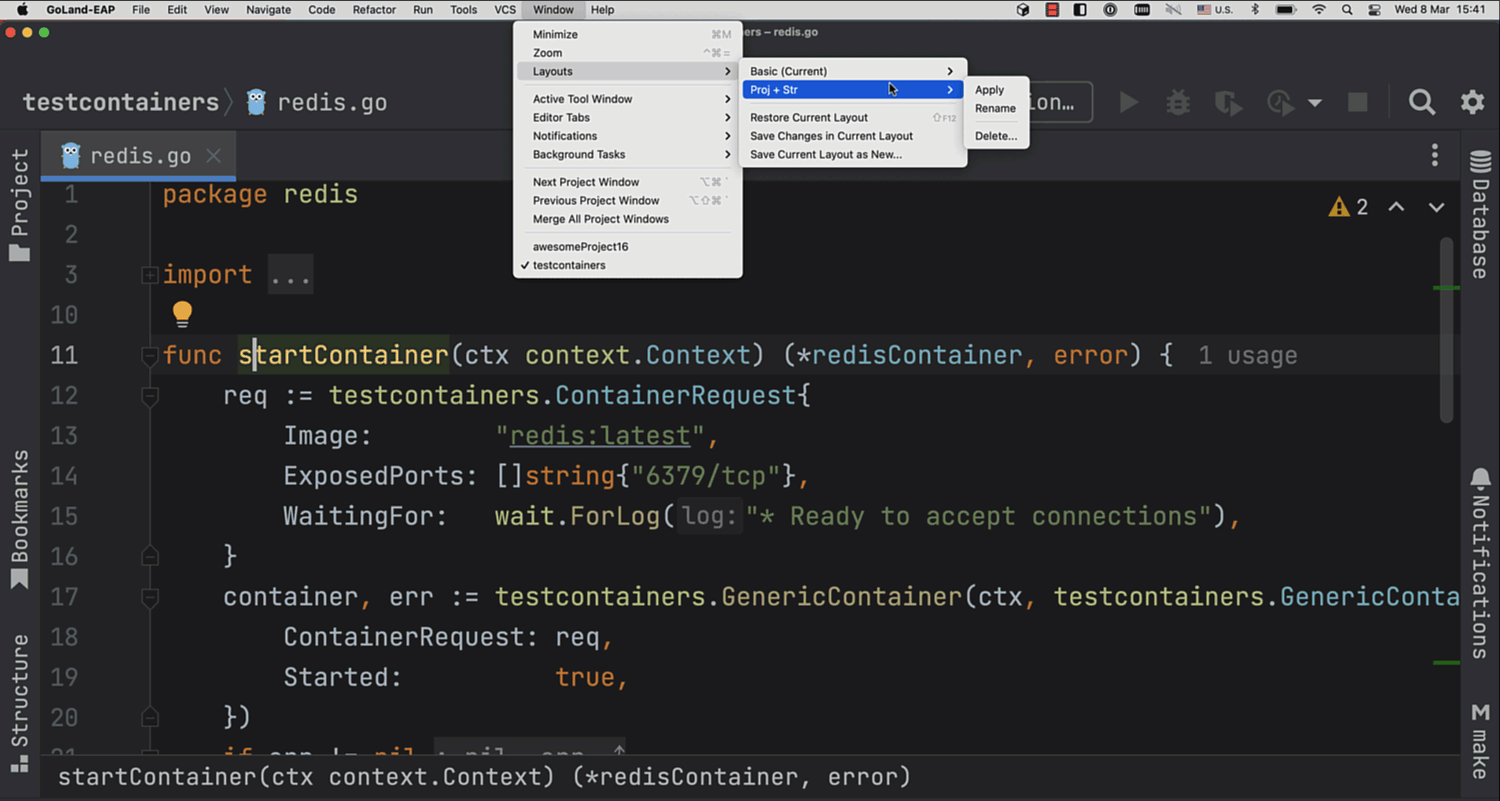 Save multiple tool window layouts
You can now save and manage several tool window layouts and switch between them when needed.
To save a new layout, arrange the tool windows as desired and go to Window |
Layouts | Save Current Layout as New. Once you adjust the arrangement, you can
either update the currently used setup using the Save Changes in Current Layout
option or save these changes for another custom layout. To activate a saved
layout, find it in the list in Window | Layouts, hover over its name, and click
Apply.
Save multiple tool window layouts
You can now save and manage several tool window layouts and switch between them when needed.
To save a new layout, arrange the tool windows as desired and go to Window |
Layouts | Save Current Layout as New. Once you adjust the arrangement, you can
either update the currently used setup using the Save Changes in Current Layout
option or save these changes for another custom layout. To activate a saved
layout, find it in the list in Window | Layouts, hover over its name, and click
Apply.
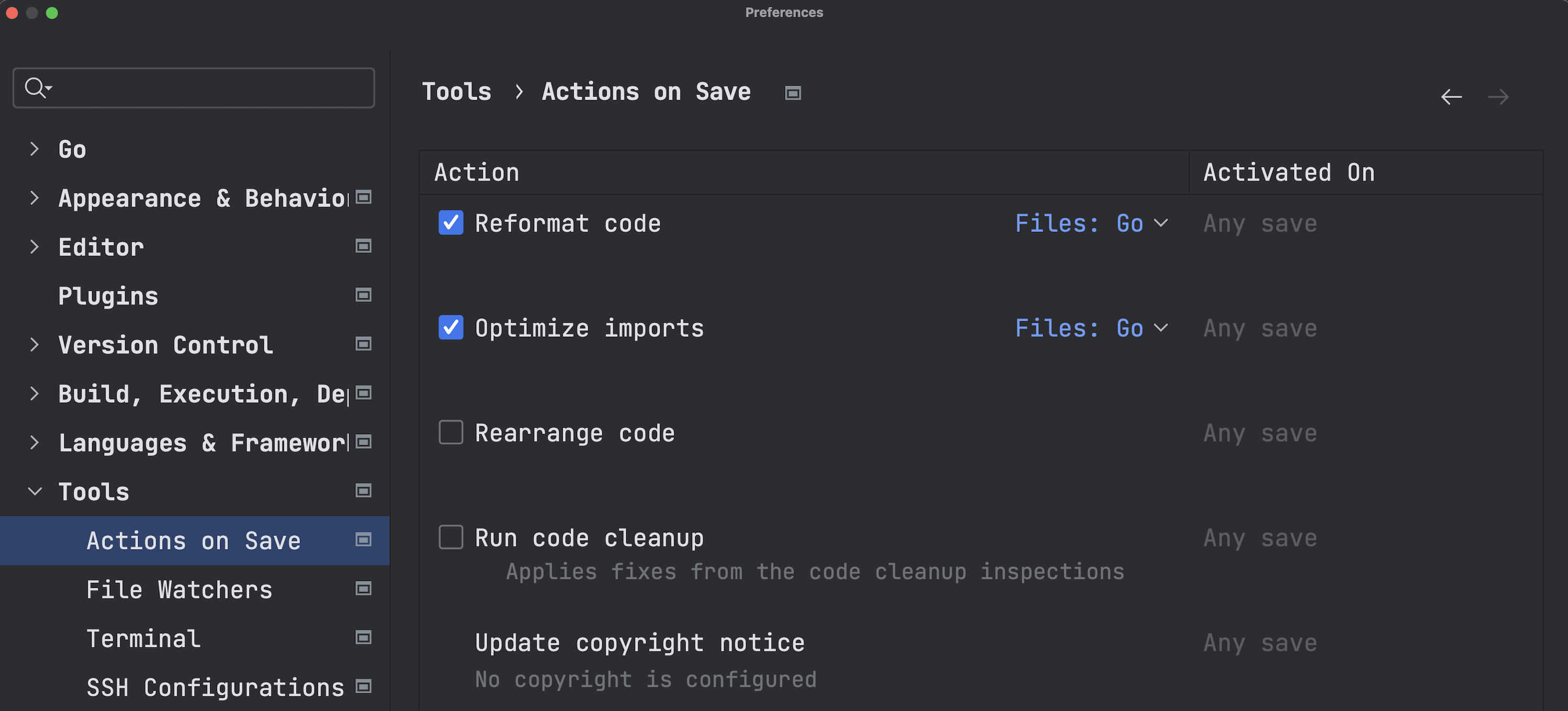 Setting to configure Actions on Save for new projects
This version adds an option to predefine the behavior of Actions on Save for new projects.
For this, go to File | New Projects Setup | Preferences For New Projects
| Tools | Actions on Save and select which actions you want to be triggered
when saving changes in your projects.
The New UI
Last year, we introduced a new, more minimalist UI for GoLand and other JetBrains IDEs.
We’ve been refining the new UI further based on your feedback.
Read on to find out about the key changes to the new UI that have landed in this release.
You can try our new UI by ticking the New UI checkbox in
Settings
| Appearance & Behavior.
Visit this page to learn more about the new UI.
Setting to configure Actions on Save for new projects
This version adds an option to predefine the behavior of Actions on Save for new projects.
For this, go to File | New Projects Setup | Preferences For New Projects
| Tools | Actions on Save and select which actions you want to be triggered
when saving changes in your projects.
The New UI
Last year, we introduced a new, more minimalist UI for GoLand and other JetBrains IDEs.
We’ve been refining the new UI further based on your feedback.
Read on to find out about the key changes to the new UI that have landed in this release.
You can try our new UI by ticking the New UI checkbox in
Settings
| Appearance & Behavior.
Visit this page to learn more about the new UI.
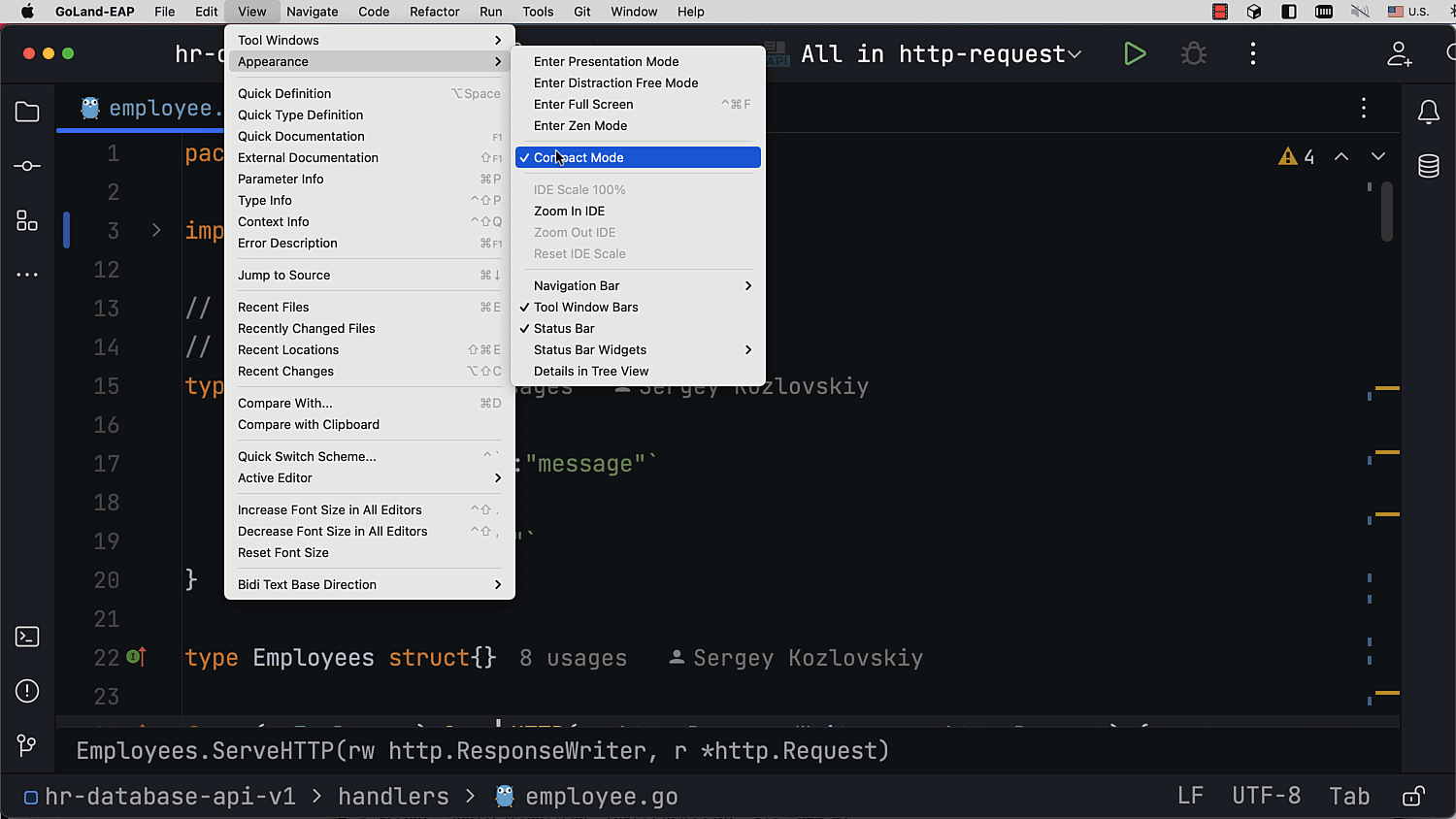 Compact Mode
To improve the user experience with our new UI on smaller screens,
we’ve introduced Compact Mode, which provides a more consolidated
look and feel due to the reduced heights for toolbars and tool window
headers, scaled-down spacings and paddings, and smaller icons and buttons.
To turn Compact Mode on, go to the View
menu and select Appearance | Compact Mode.
Also, the top toolbar is no longer visible in Zen and Distraction Free modes.
Compact Mode
To improve the user experience with our new UI on smaller screens,
we’ve introduced Compact Mode, which provides a more consolidated
look and feel due to the reduced heights for toolbars and tool window
headers, scaled-down spacings and paddings, and smaller icons and buttons.
To turn Compact Mode on, go to the View
menu and select Appearance | Compact Mode.
Also, the top toolbar is no longer visible in Zen and Distraction Free modes.
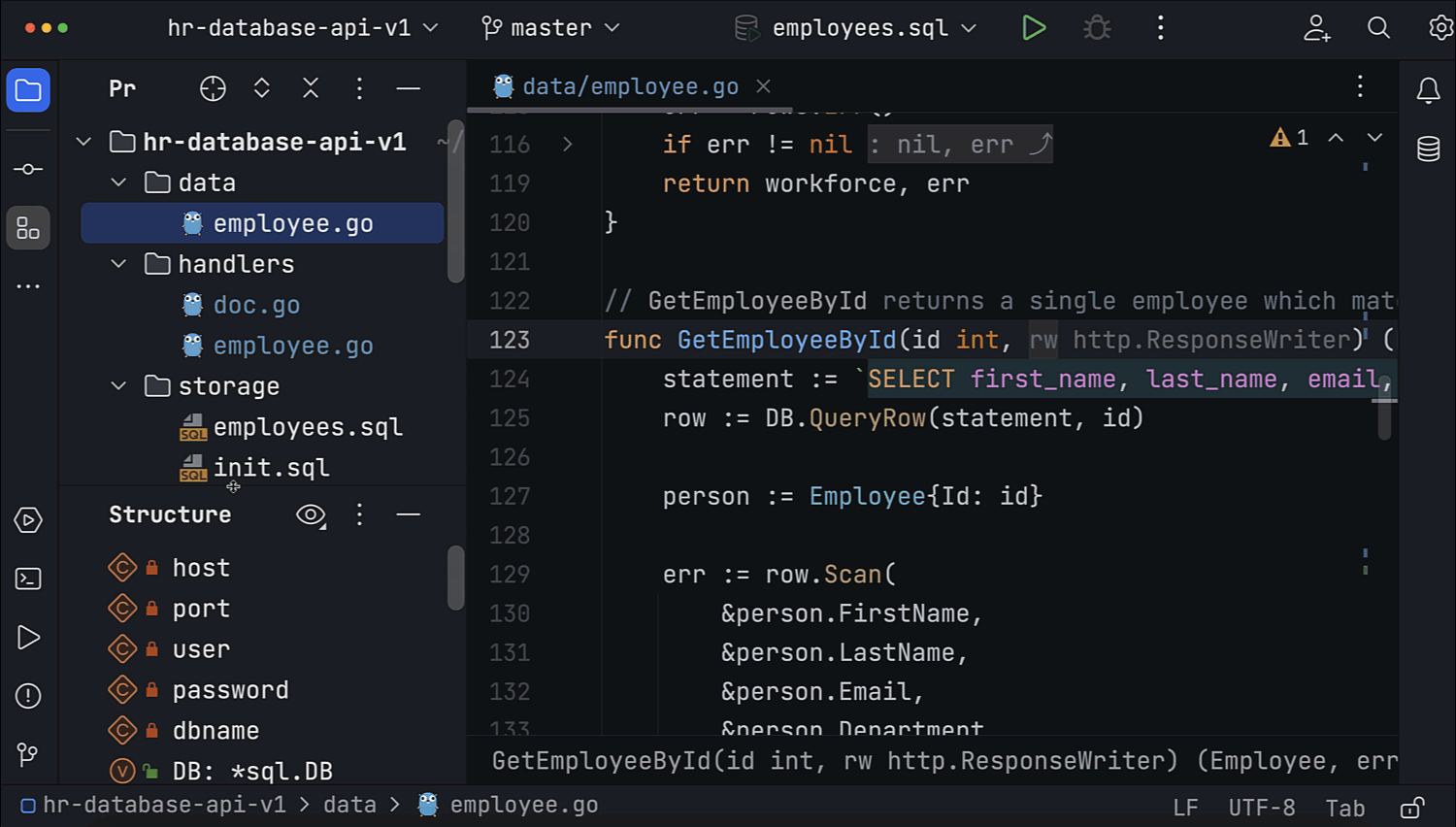 Vertical split for tool windows
For the new UI, we’ve introduced the option to split the tool window
area so that you can conveniently arrange these windows.
To add a tool window to this area and place it in the lower part,
drag its icon along the sidebar and drop it under the separator.
Alternatively, you can right-click on an icon to call the context menu
and assign the new position for a tool window using the Move to action.
Vertical split for tool windows
For the new UI, we’ve introduced the option to split the tool window
area so that you can conveniently arrange these windows.
To add a tool window to this area and place it in the lower part,
drag its icon along the sidebar and drop it under the separator.
Alternatively, you can right-click on an icon to call the context menu
and assign the new position for a tool window using the Move to action.
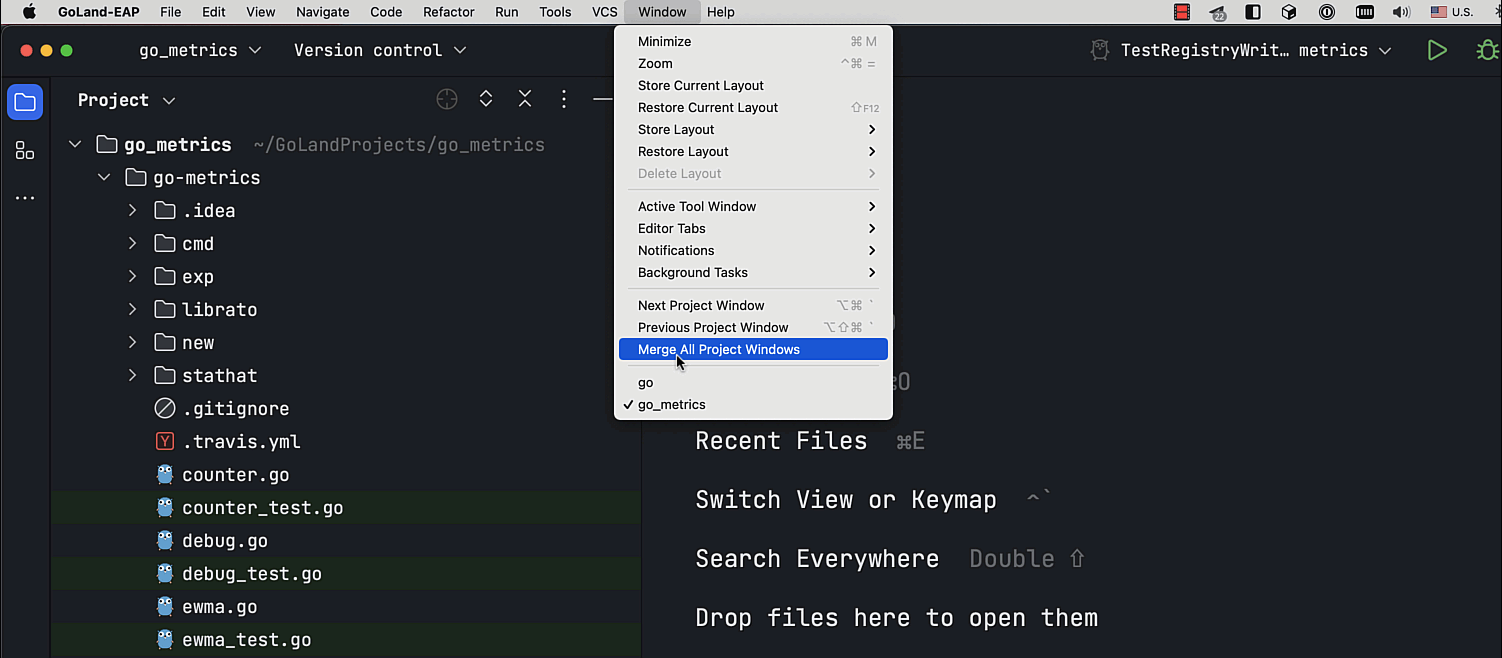 Project tabs for macOS users
When you have several projects open, you can now easily switch between them using
project tabs displayed under the main toolbar.
To do this, go to Window | Merge All Project Windows.
Project tabs for macOS users
When you have several projects open, you can now easily switch between them using
project tabs displayed under the main toolbar.
To do this, go to Window | Merge All Project Windows.
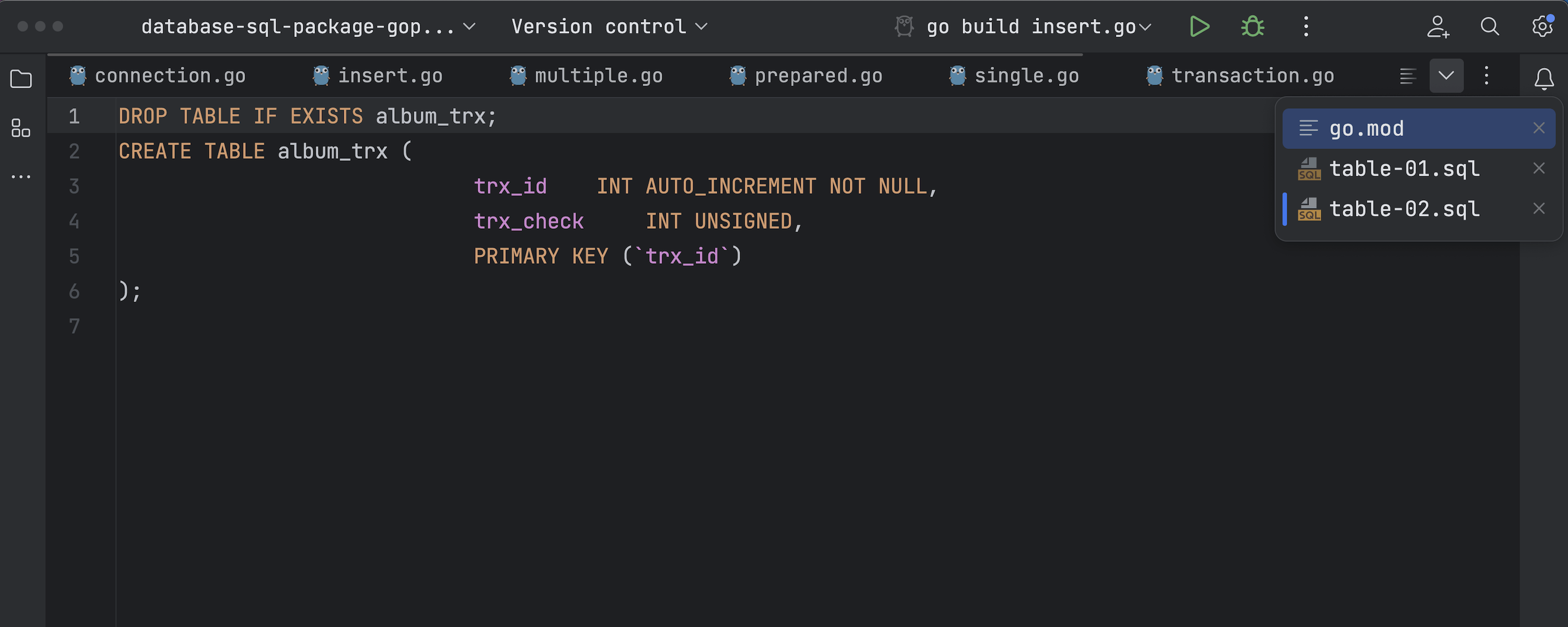 Show Hidden Tabs is back
We’ve added the Show Hidden Tabs feature in the new UI.
You now have a drop-down showing the complete list of open tabs,
as they may have been hidden before.
Show Hidden Tabs is back
We’ve added the Show Hidden Tabs feature in the new UI.
You now have a drop-down showing the complete list of open tabs,
as they may have been hidden before.
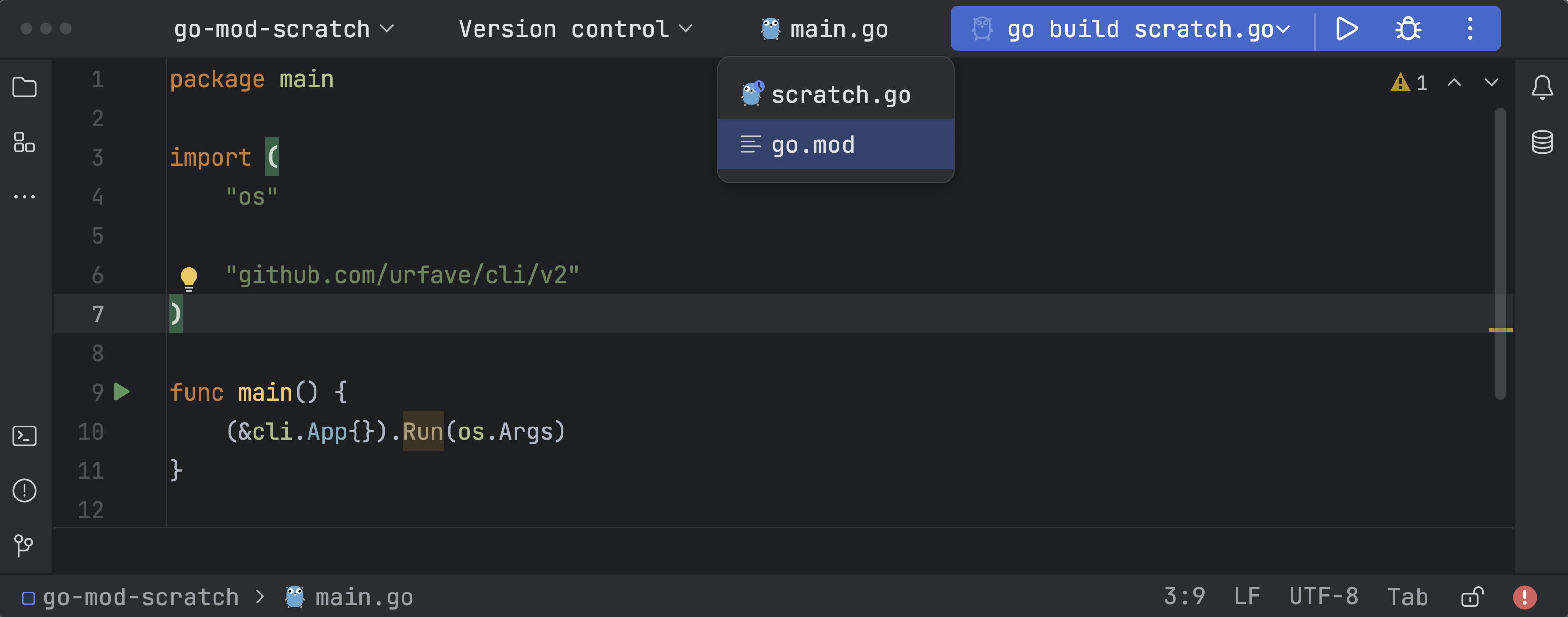 Visible file name pane when tabs are hidden
We’ve fine-tuned the user experience of the new UI by adding a pane
that displays the name of the file that is currently open when editor tabs are hidden.
Visible file name pane when tabs are hidden
We’ve fine-tuned the user experience of the new UI by adding a pane
that displays the name of the file that is currently open when editor tabs are hidden.
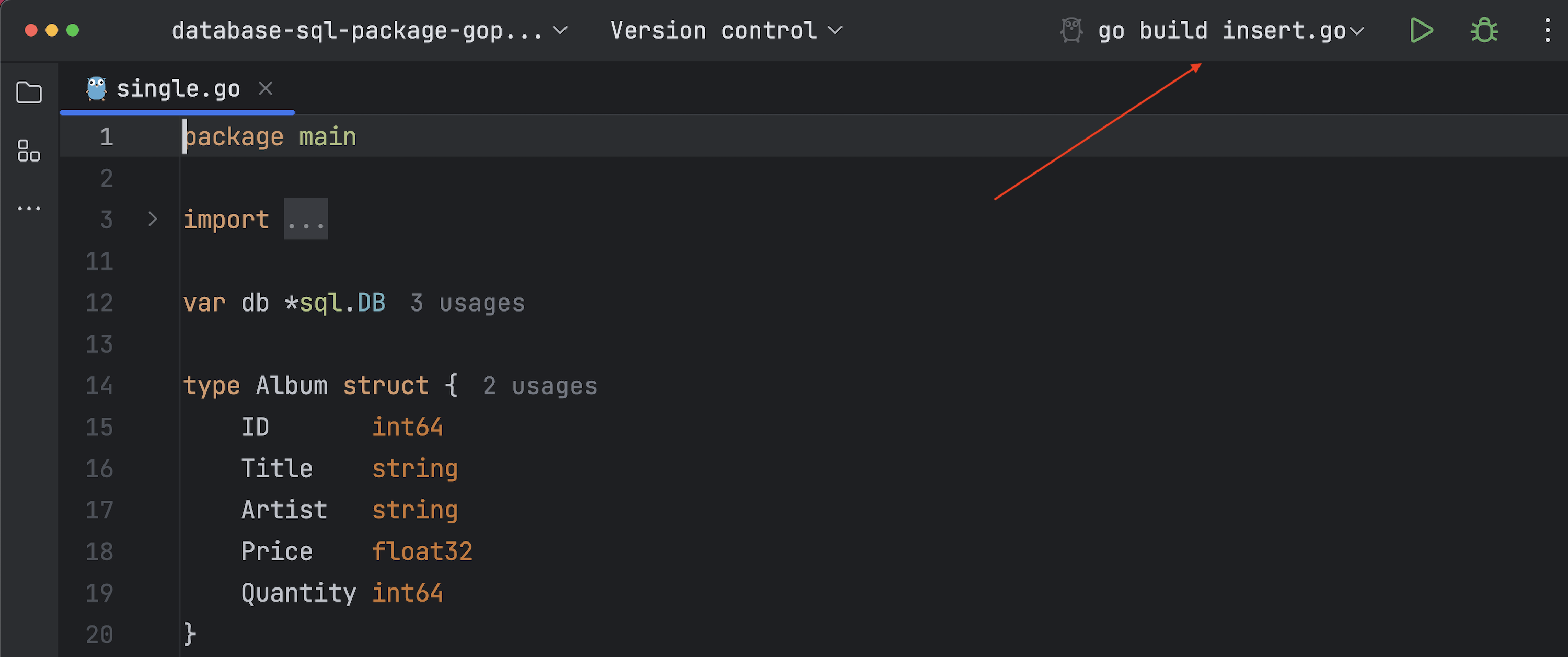 Redesigned Run widget
We’ve redesigned the Run widget at the top of the IDE window.
With the icons now colored green – rather than the area around
them being blocked out in color – the appearance is subtler and easier on the eyes.
Docker
Redesigned Run widget
We’ve redesigned the Run widget at the top of the IDE window.
With the icons now colored green – rather than the area around
them being blocked out in color – the appearance is subtler and easier on the eyes.
Docker
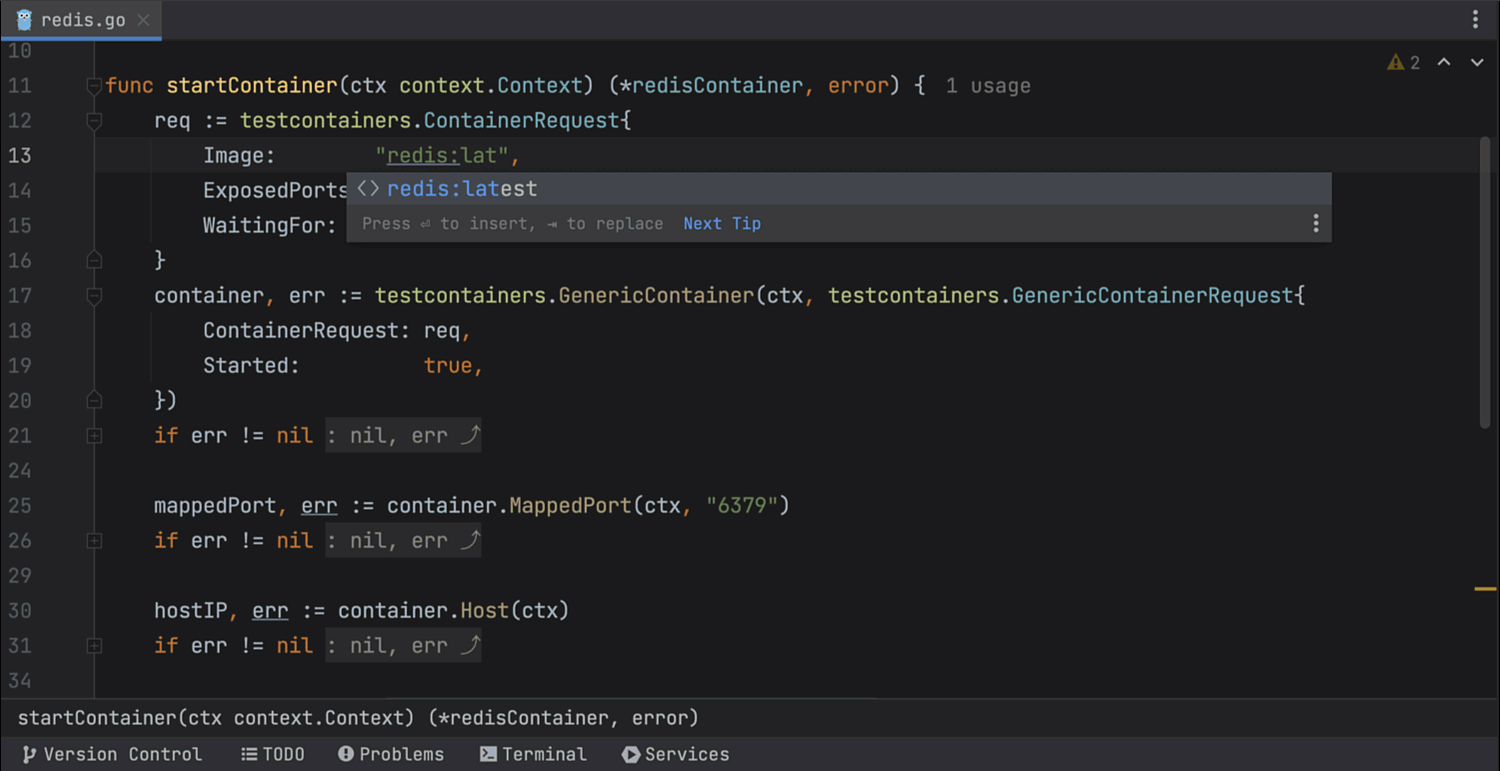 Completion for testcontainers
In this build, we’ve added completion for container
names when you use the package.
After typing in the container name, you can use the
Pull Docker image action that was implemented earlier.
Completion for testcontainers
In this build, we’ve added completion for container
names when you use the package.
After typing in the container name, you can use the
Pull Docker image action that was implemented earlier.
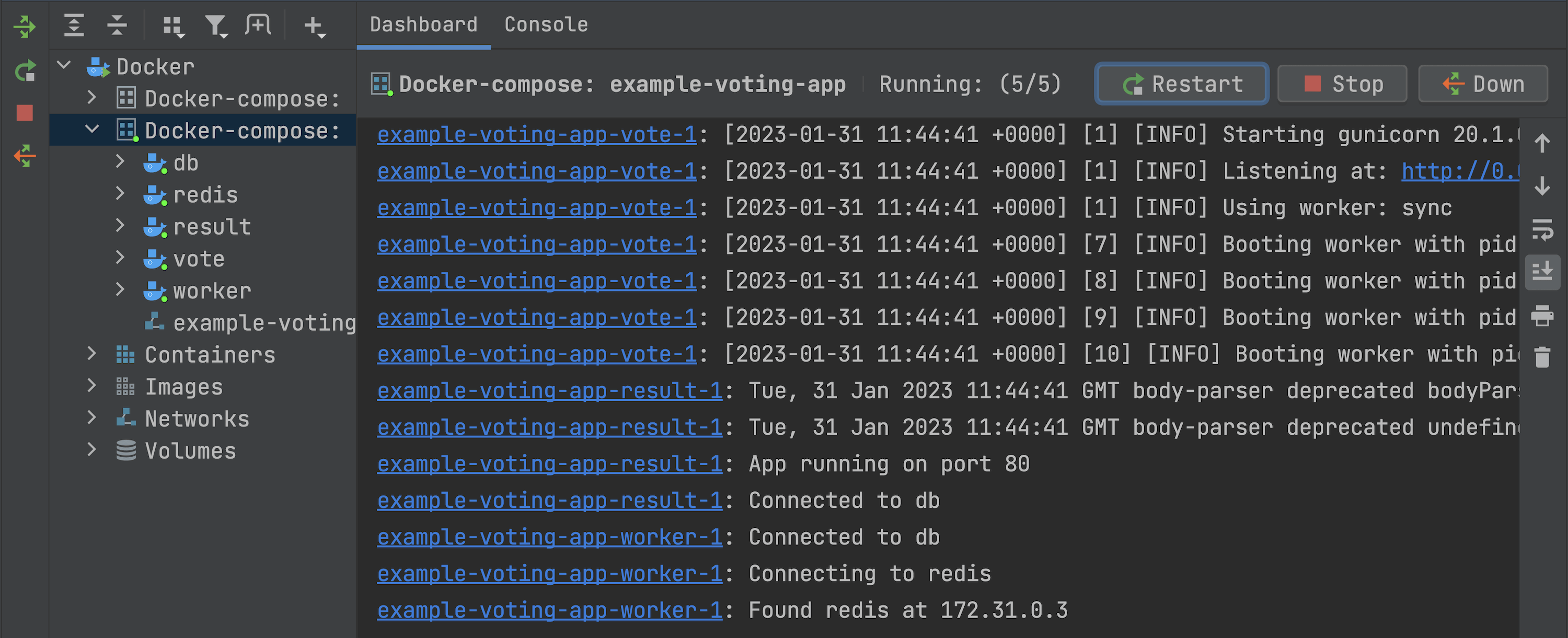 Merged log from all Docker Compose containers
The Dashboard tab of the Docker-compose node now pulls together
logs from every Docker Compose container and displays them
all in one place, updated in real time.
Merged log from all Docker Compose containers
The Dashboard tab of the Docker-compose node now pulls together
logs from every Docker Compose container and displays them
all in one place, updated in real time.
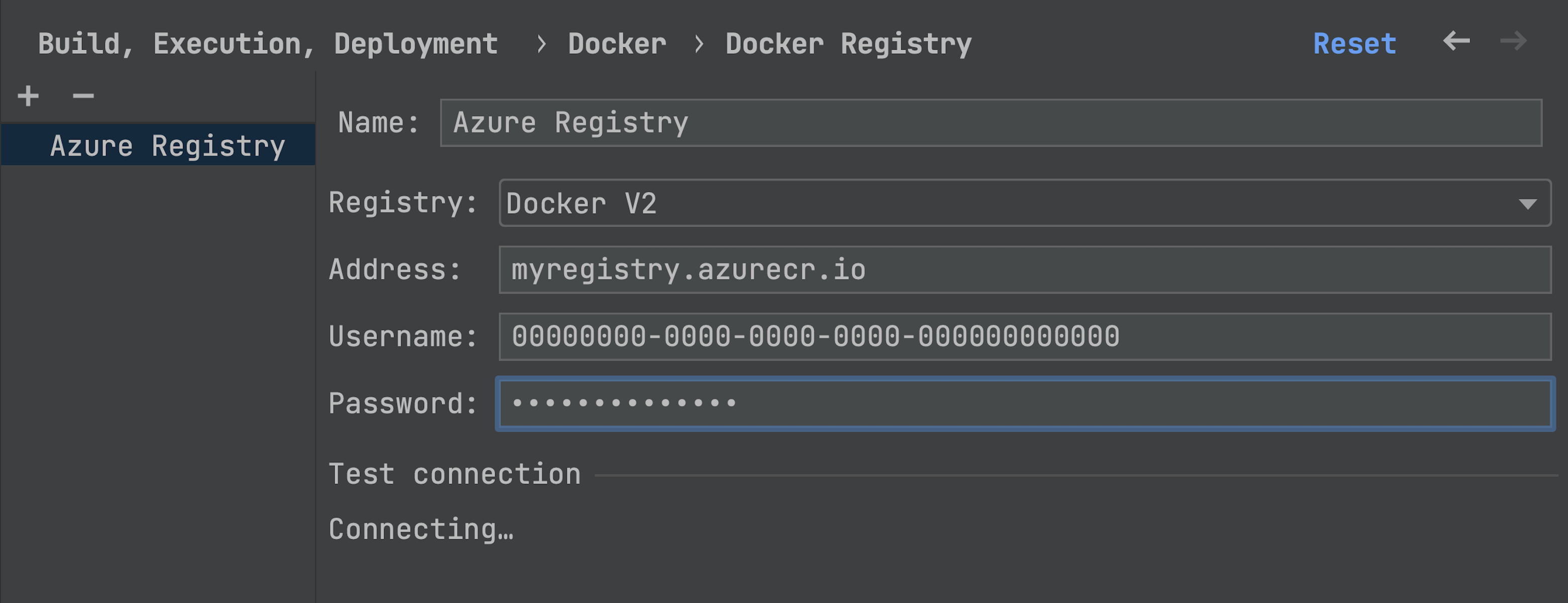 Support for Azure Container Registry
You can now easily connect to Azure Container Registry. Go to
Settings
| Build, Execution, Deployment | Docker | Docker Registry
and set it up by selecting the Docker V2 option in the Registry input field.
Support for Azure Container Registry
You can now easily connect to Azure Container Registry. Go to
Settings
| Build, Execution, Deployment | Docker | Docker Registry
and set it up by selecting the Docker V2 option in the Registry input field.
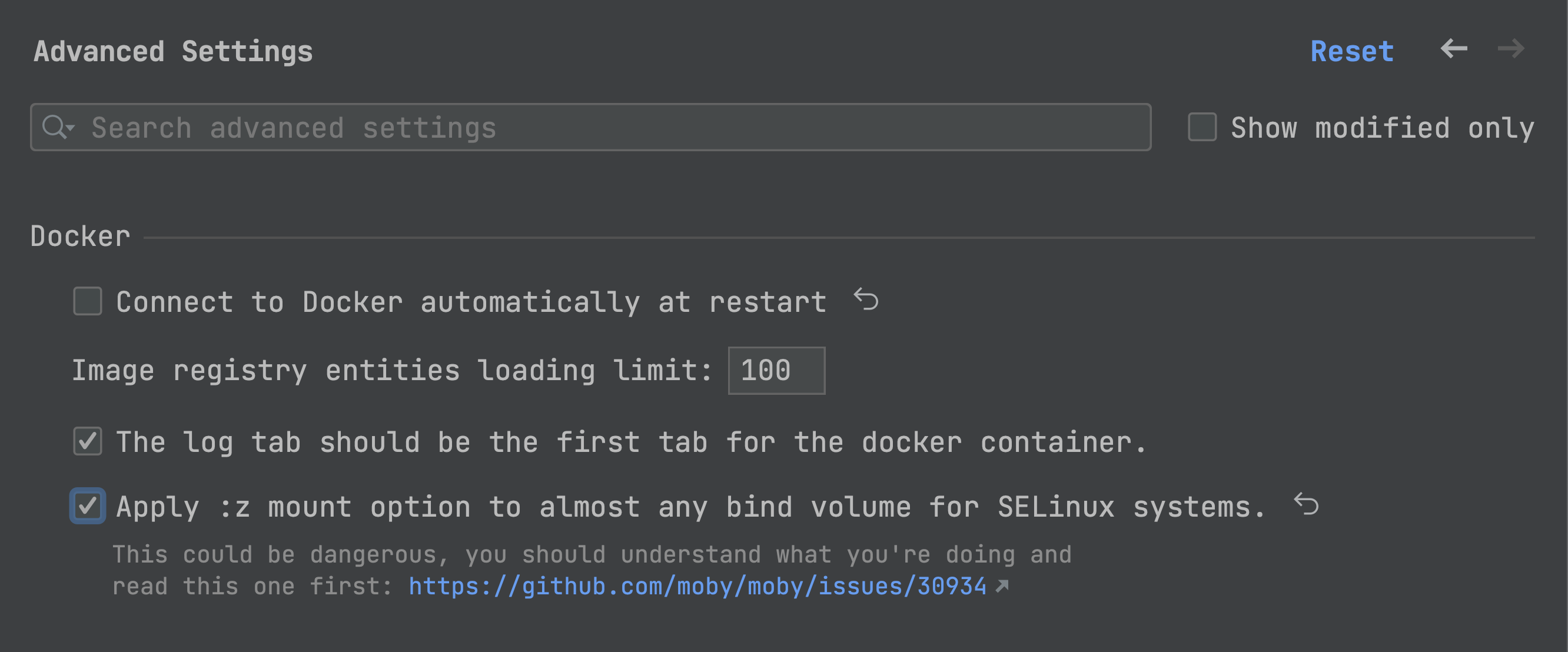 New setting to apply the :z mount option to bind volumes on SELinux
Now you can add :z configuration flags to Docker bind mounts,
which allows you to connect volumes to Docker containers on
SELinux workstations. To enable this functionality, go to
Settings
| Advanced Settings | Docker.
Kubernetes
New setting to apply the :z mount option to bind volumes on SELinux
Now you can add :z configuration flags to Docker bind mounts,
which allows you to connect volumes to Docker containers on
SELinux workstations. To enable this functionality, go to
Settings
| Advanced Settings | Docker.
Kubernetes
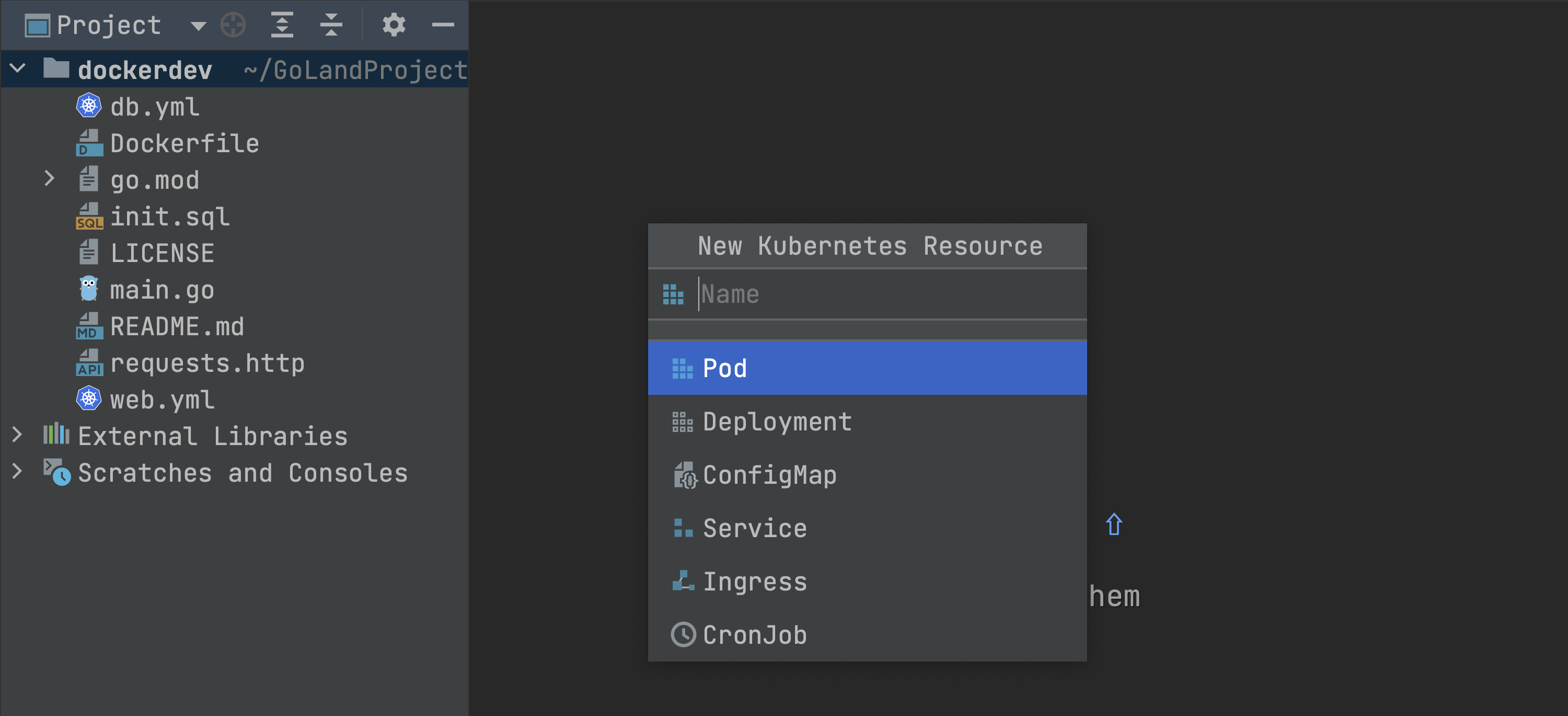 File templates in the New Kubernetes Resource popup
To make creating new Kubernetes files easier, we’ve added a new action
– Kubernetes Resource – to the New menu that
appears when you right-click in the Project tool window.
Once you select the Kubernetes Resource option, you’ll see a
popup that features a list of the most popular resource types,
such as Pod, Deployment, ConfigMap, etc.
File templates in the New Kubernetes Resource popup
To make creating new Kubernetes files easier, we’ve added a new action
– Kubernetes Resource – to the New menu that
appears when you right-click in the Project tool window.
Once you select the Kubernetes Resource option, you’ll see a
popup that features a list of the most popular resource types,
such as Pod, Deployment, ConfigMap, etc.
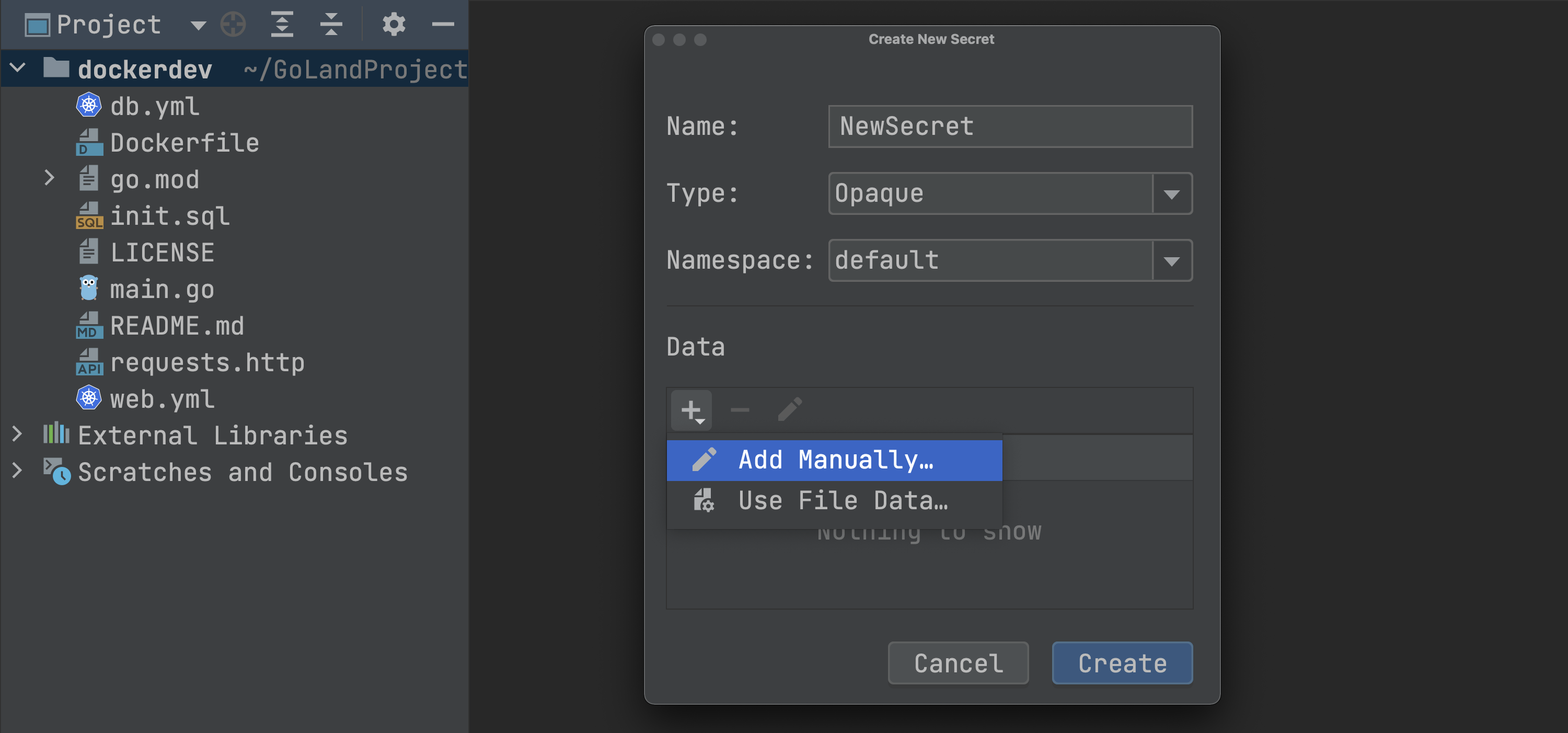 Action to create new Kubernetes Secrets
We’ve introduced a new dialog to create Kubernetes Secrets.
To define a new secret, you can input a key and value manually.
Alternatively, you can specify a file whose content will be
used for the value of the resulting secret.
Action to create new Kubernetes Secrets
We’ve introduced a new dialog to create Kubernetes Secrets.
To define a new secret, you can input a key and value manually.
Alternatively, you can specify a file whose content will be
used for the value of the resulting secret.
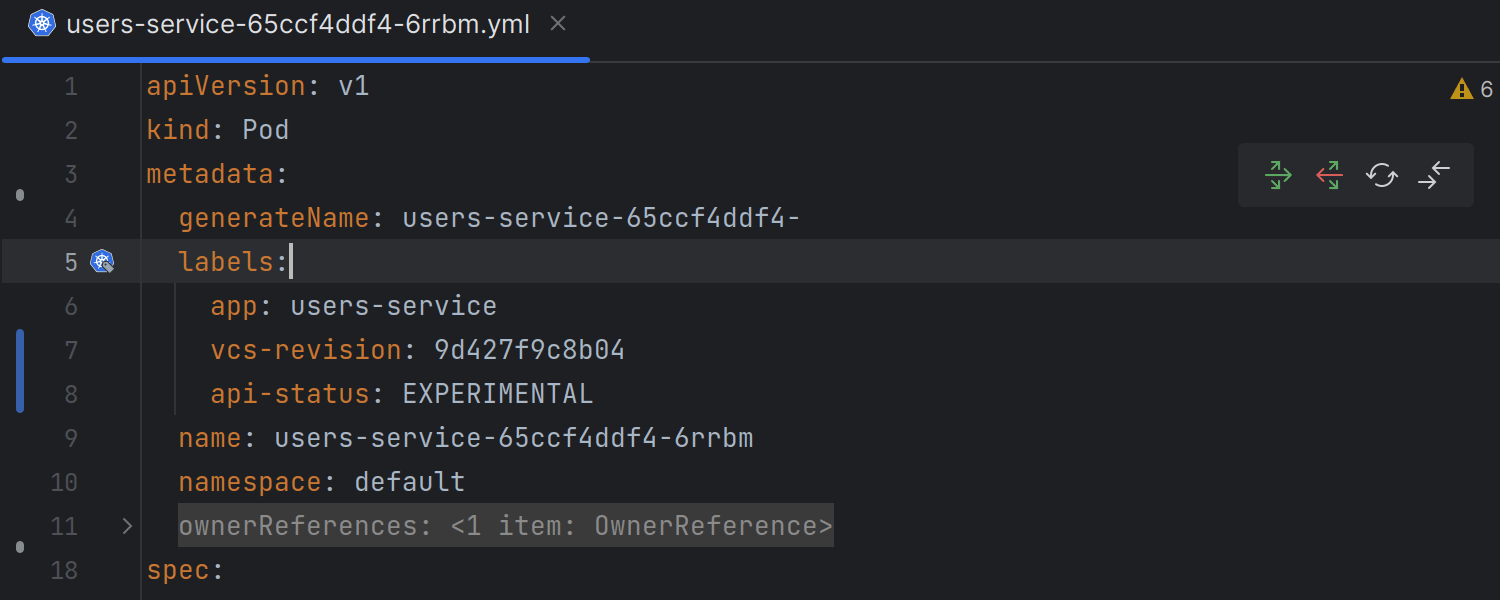 Color-coded change markers for resources loaded from cluster
When you use the View YAML action for resources from a cluster and
make any changes in the opened file, the IDE highlights all of your
edits with color-coded marks in the gutter. This way, you can be sure
that the changes are made to the required parts of the resource before
you apply them back to the cluster.
Color-coded change markers for resources loaded from cluster
When you use the View YAML action for resources from a cluster and
make any changes in the opened file, the IDE highlights all of your
edits with color-coded marks in the gutter. This way, you can be sure
that the changes are made to the required parts of the resource before
you apply them back to the cluster.
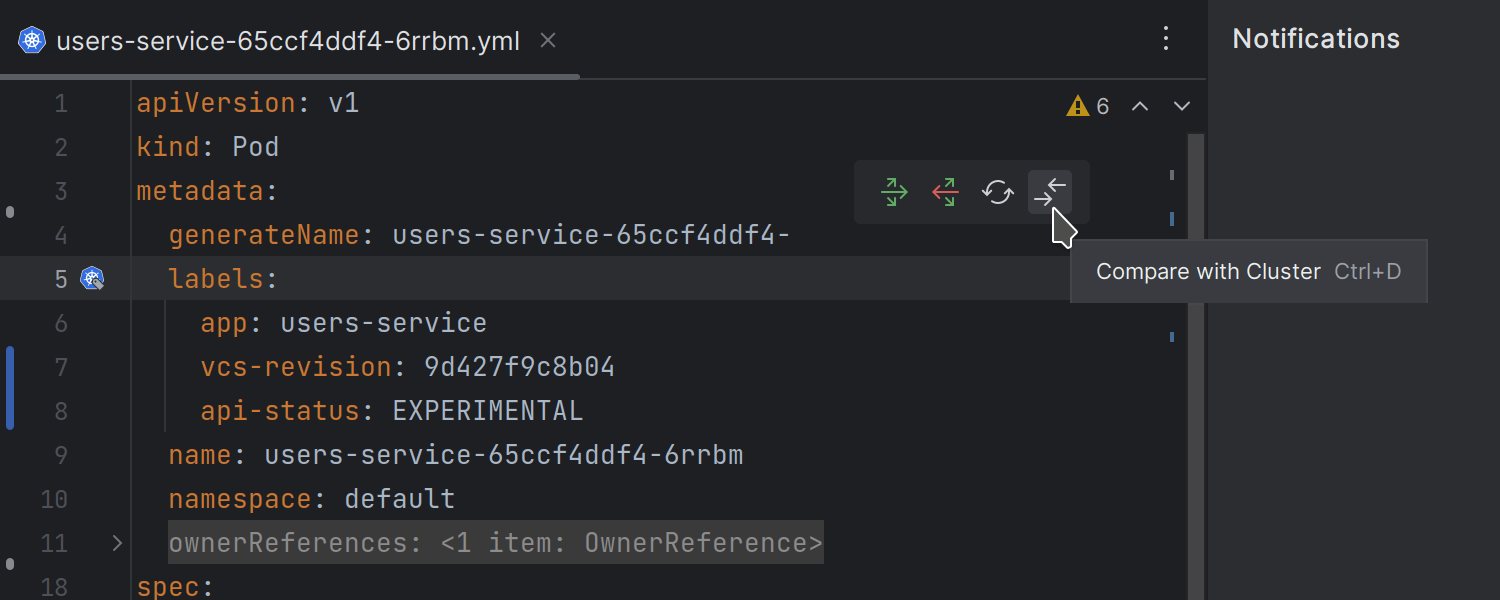 Additionally, using the Compare with Cluster icon, you can open
a full diff view that will fetch the resource’s current version from the
cluster and compare it with the local version.
Additionally, using the Compare with Cluster icon, you can open
a full diff view that will fetch the resource’s current version from the
cluster and compare it with the local version.
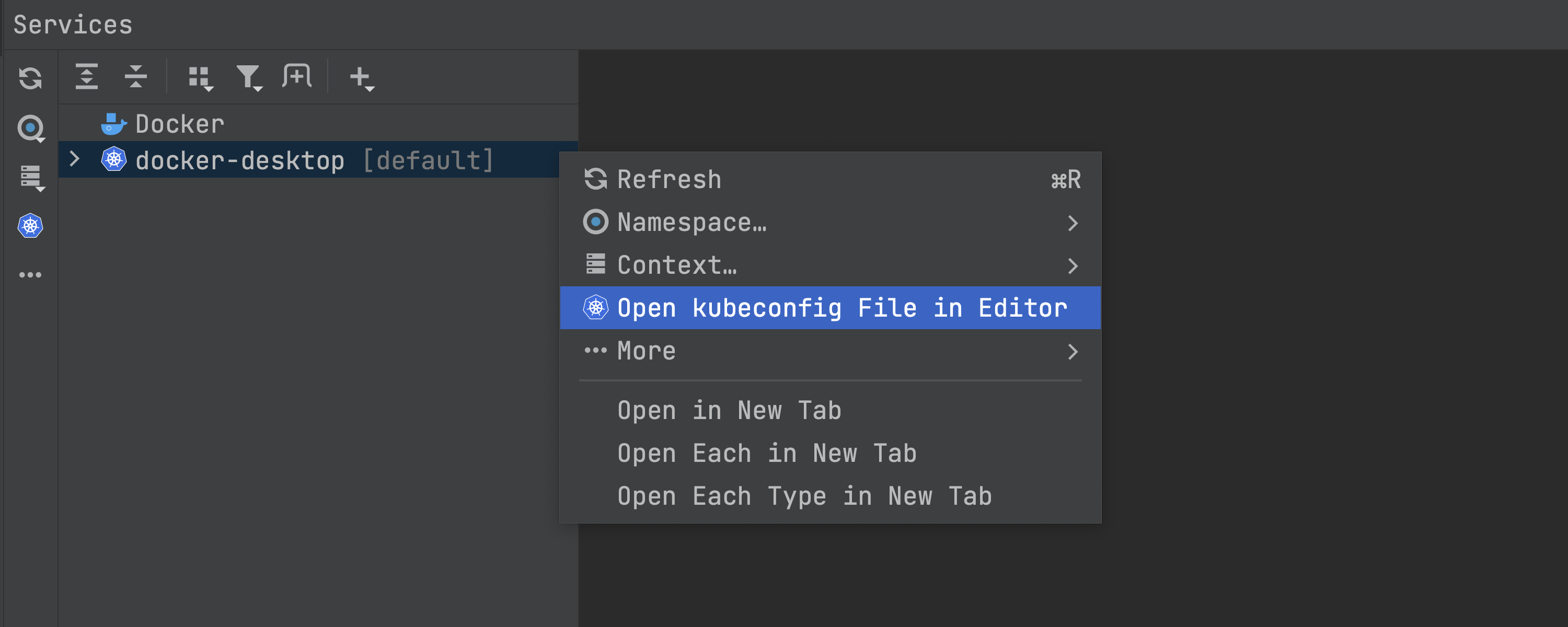 Improved user experience with kubeconfig files
You can now easily access a kubeconfig file in the Services
view and open it in the editor. If you change a kubeconfig
file outside of GoLand, the IDE will detect this and automatically
refresh its configuration in the Services tool window. Furthermore,
the IDE now supports both code highlighting and completion for kubeconfig files.
Improved user experience with kubeconfig files
You can now easily access a kubeconfig file in the Services
view and open it in the editor. If you change a kubeconfig
file outside of GoLand, the IDE will detect this and automatically
refresh its configuration in the Services tool window. Furthermore,
the IDE now supports both code highlighting and completion for kubeconfig files.
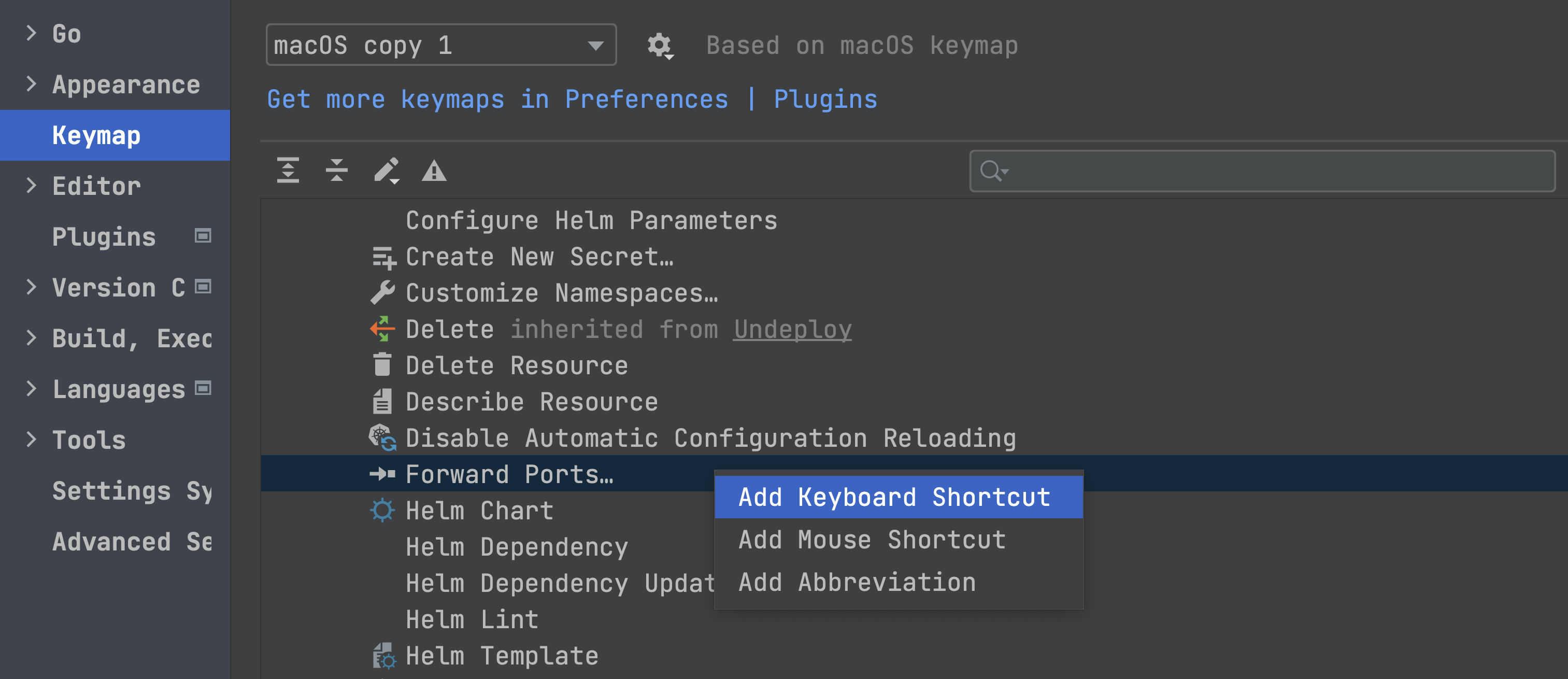 Ability to assign custom shortcuts for actions in the Services view
You can now assign shortcuts for most Kubernetes actions in
the Services view, like Forward Ports, Delete Resource, and
Describe Resource, among others. To set your custom shortcuts,
go to Settings
| Keymap | Plugins | Kubernetes.
Markdown
Ability to assign custom shortcuts for actions in the Services view
You can now assign shortcuts for most Kubernetes actions in
the Services view, like Forward Ports, Delete Resource, and
Describe Resource, among others. To set your custom shortcuts,
go to Settings
| Keymap | Plugins | Kubernetes.
Markdown
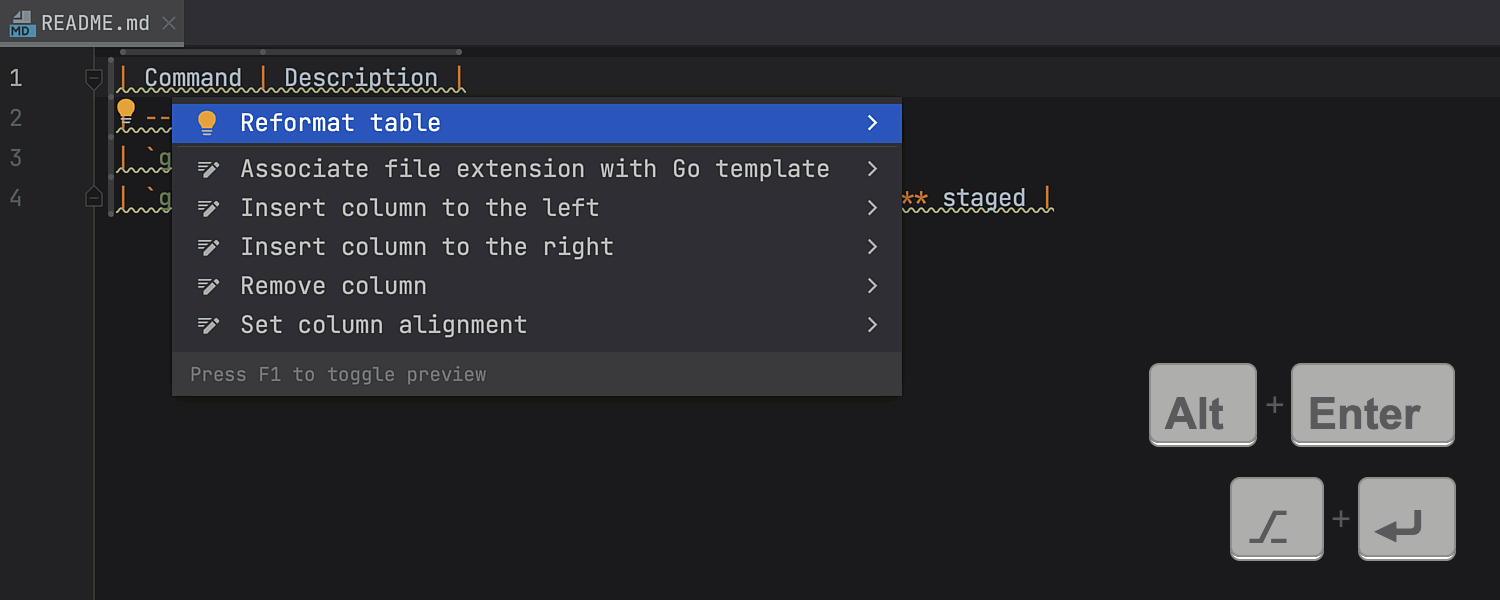 Reformat table
A new intention action allows you to correct the formatting of
tables in Markdown files. You can access the quick-fix via the
shortcut Alt+Enter or by pressing the yellow bulb icon
and selecting Reformat table from the list that appears.
Reformat table
A new intention action allows you to correct the formatting of
tables in Markdown files. You can access the quick-fix via the
shortcut Alt+Enter or by pressing the yellow bulb icon
and selecting Reformat table from the list that appears.
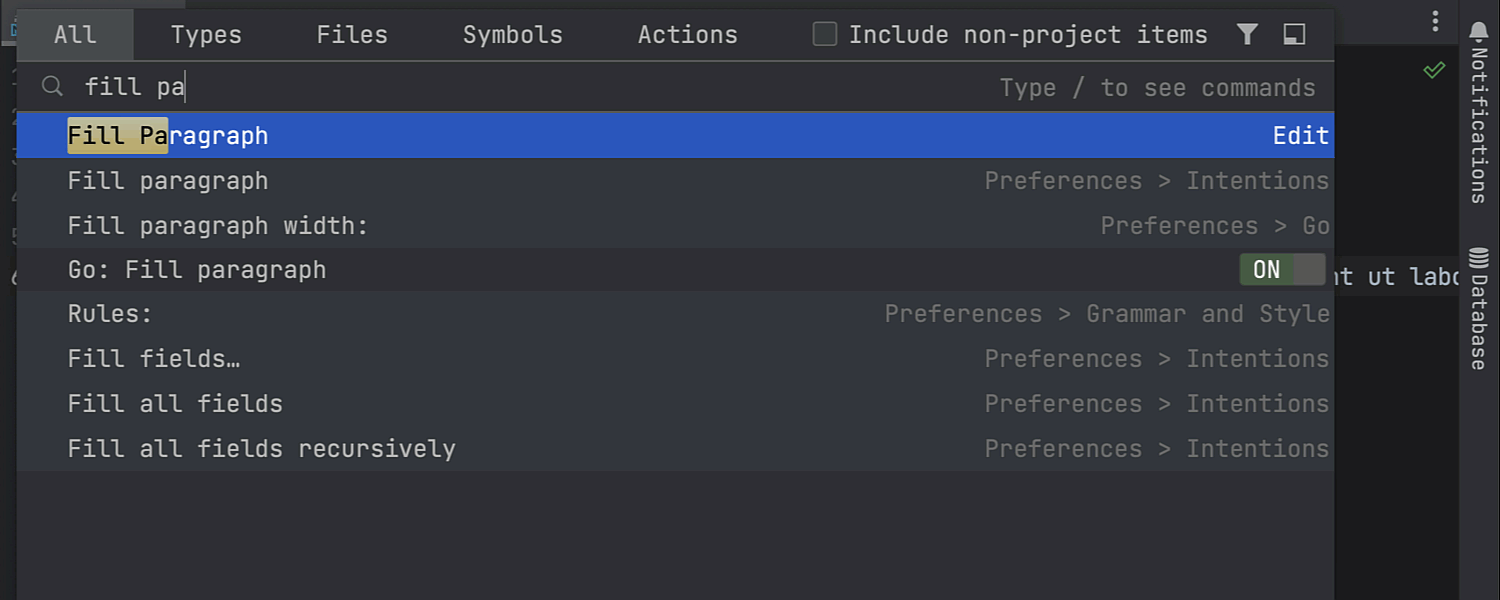 Fill Paragraph
The Fill Paragraph editor action is now supported for Markdown files,
allowing you to break long texts into several lines of even length.
To do this, set the caret inside the paragraph you want to edit and
call the action from the Edit menu or search for the
Fill Paragraph command using
Search everywhere (Double Shift) and execute it.
Fill Paragraph
The Fill Paragraph editor action is now supported for Markdown files,
allowing you to break long texts into several lines of even length.
To do this, set the caret inside the paragraph you want to edit and
call the action from the Edit menu or search for the
Fill Paragraph command using
Search everywhere (Double Shift) and execute it.
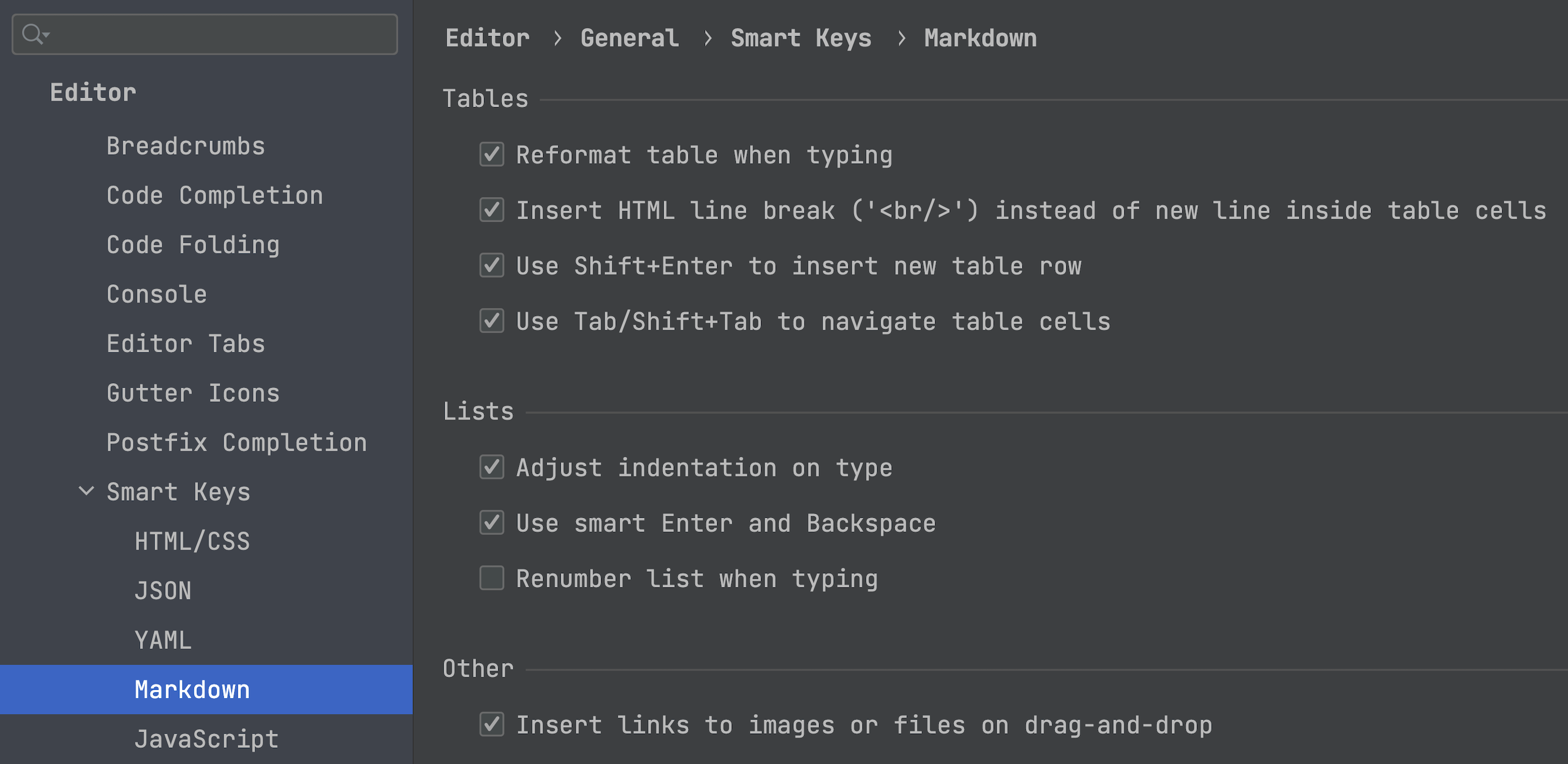 New Smart Keys settings page
We’ve added a dedicated page for configuring and editing your Markdown preferences in
Settings
| Editor | General | Smart Keys.
This page should make it easier to manage your preferences,
as it provides separate checkboxes for various editor features,
replacing the single checkbox previously stored in
Settings
| Languages & Frameworks.
Version control
New Smart Keys settings page
We’ve added a dedicated page for configuring and editing your Markdown preferences in
Settings
| Editor | General | Smart Keys.
This page should make it easier to manage your preferences,
as it provides separate checkboxes for various editor features,
replacing the single checkbox previously stored in
Settings
| Languages & Frameworks.
Version control
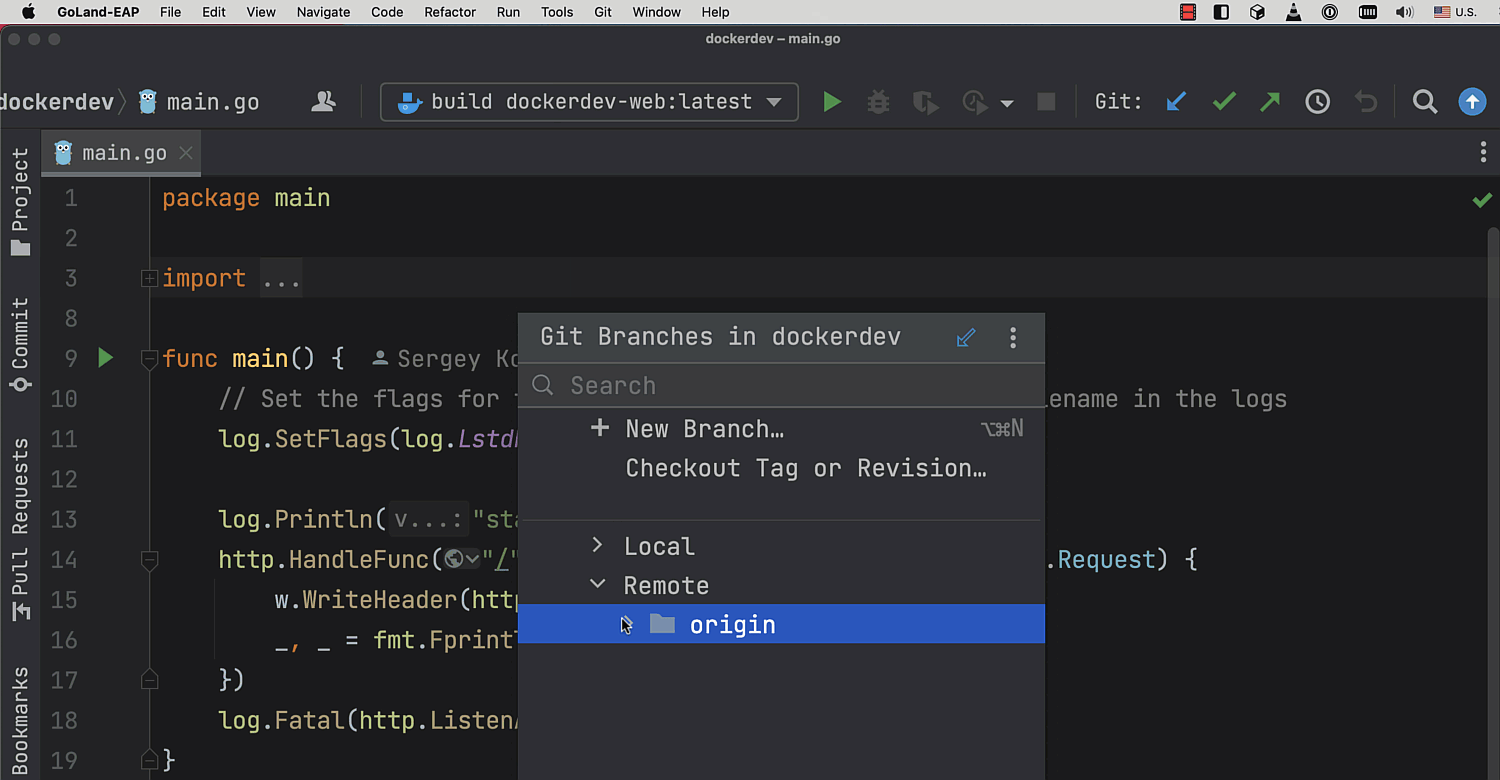 Improved Branches popup
We’ve improved the usability of the Branches popup.
For instance, navigating between branches is now easier,
as they are grouped and stored in expandable lists.
Improved Branches popup
We’ve improved the usability of the Branches popup.
For instance, navigating between branches is now easier,
as they are grouped and stored in expandable lists.
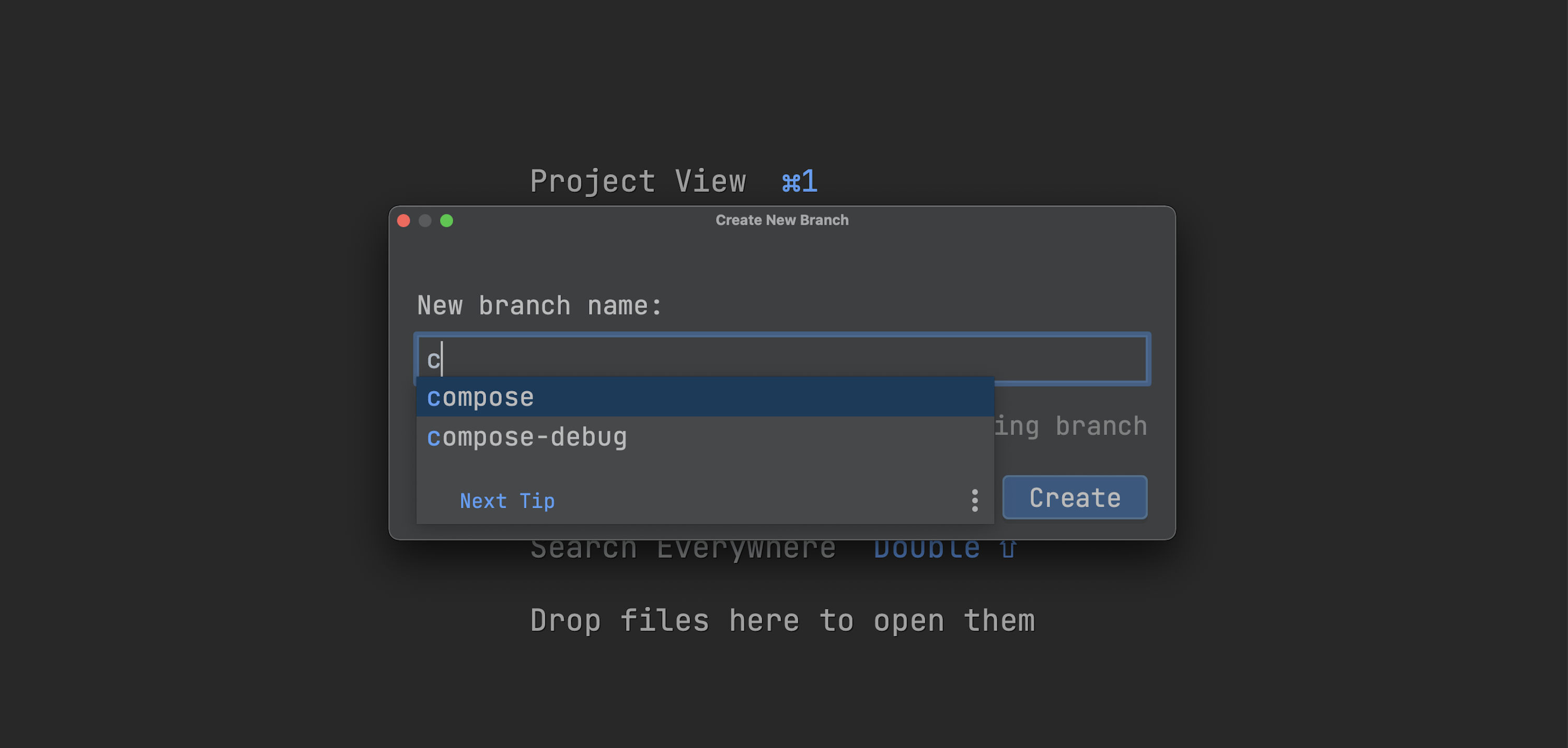 Completion in the Create New Branch popup
We’ve implemented completion in the Create New Branch popup.
Press Ctrl+Space, and the IDE will suggest relevant
prefixes based on the names of existing local branches.
Completion in the Create New Branch popup
We’ve implemented completion in the Create New Branch popup.
Press Ctrl+Space, and the IDE will suggest relevant
prefixes based on the names of existing local branches.
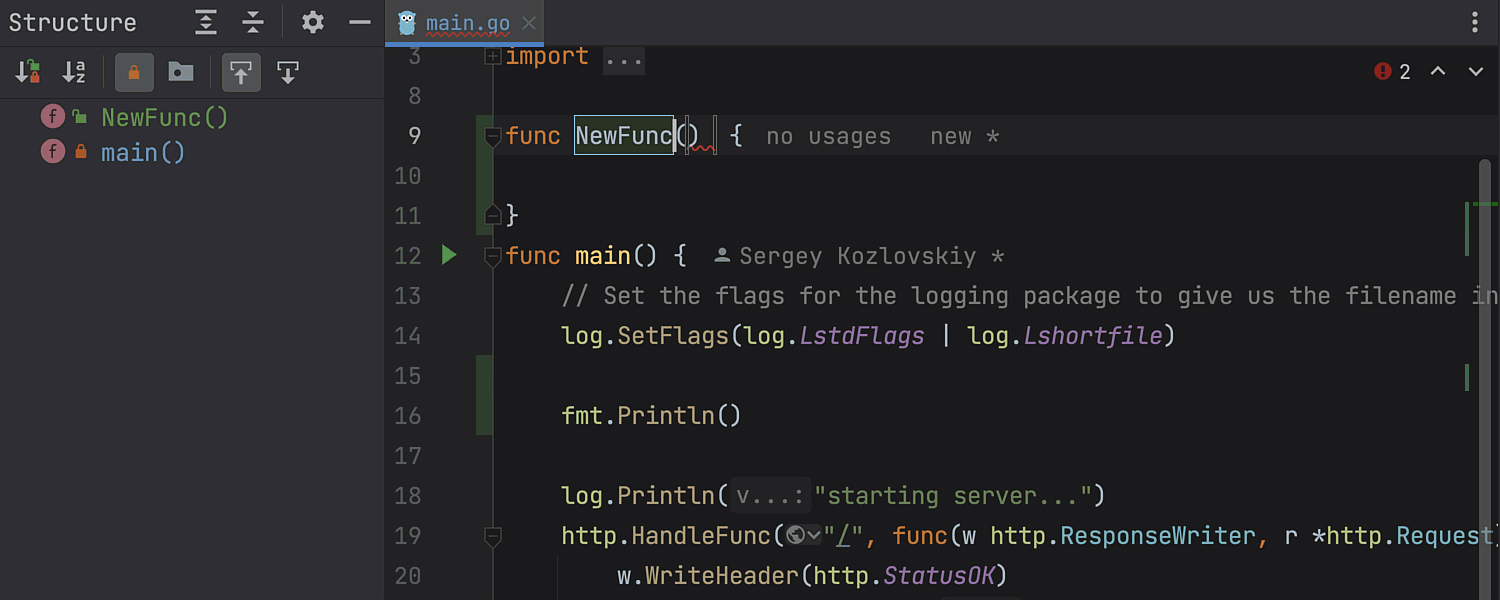 VCS status color hints in the Structure tool window
To make tracking changes to files more convenient, we’ve added
color hints to the Structure tool window. The names of modified
objects will now become blue, and the names of the newly added
objects will appear in the tool window highlighted in green.
VCS status color hints in the Structure tool window
To make tracking changes to files more convenient, we’ve added
color hints to the Structure tool window. The names of modified
objects will now become blue, and the names of the newly added
objects will appear in the tool window highlighted in green.
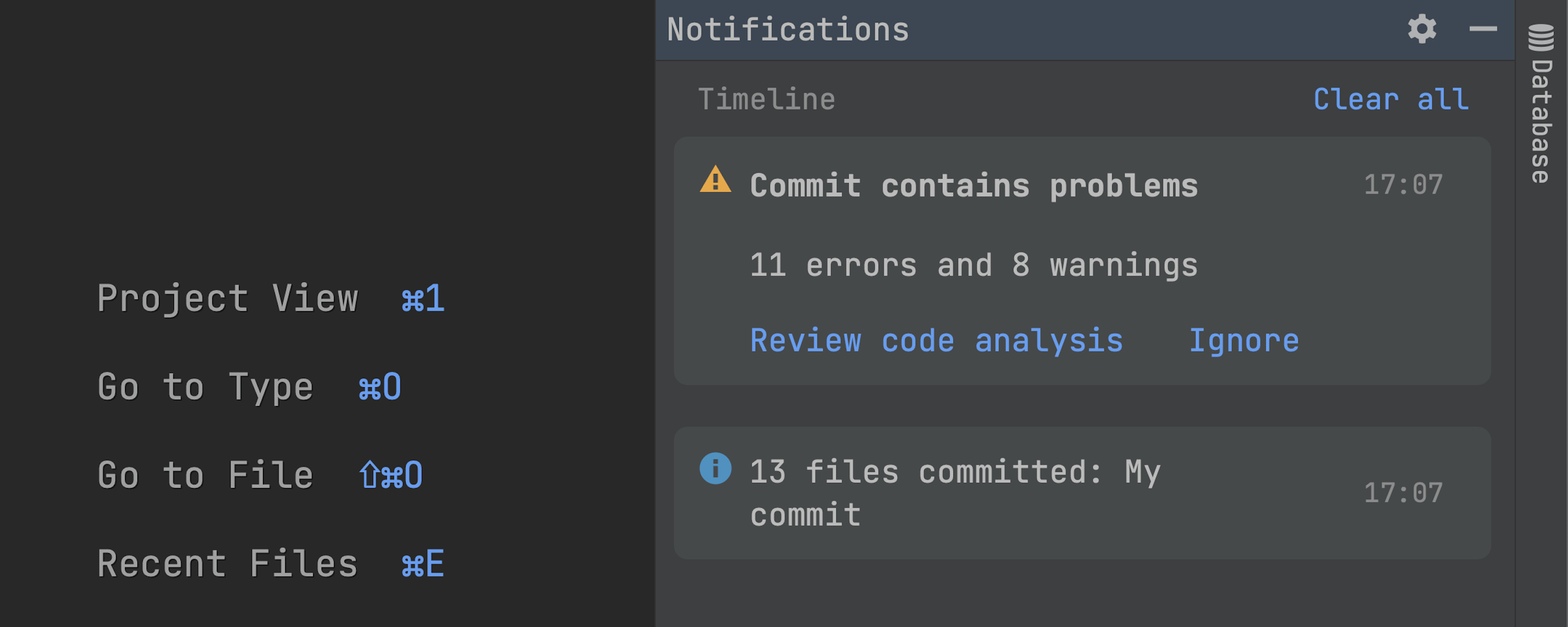 Background commit checks
We’ve reworked the behavior of the commit checks for Git and Mercurial
to speed up the overall commit process. Checks are now performed in
the background after you commit but before you push.
Background commit checks
We’ve reworked the behavior of the commit checks for Git and Mercurial
to speed up the overall commit process. Checks are now performed in
the background after you commit but before you push.
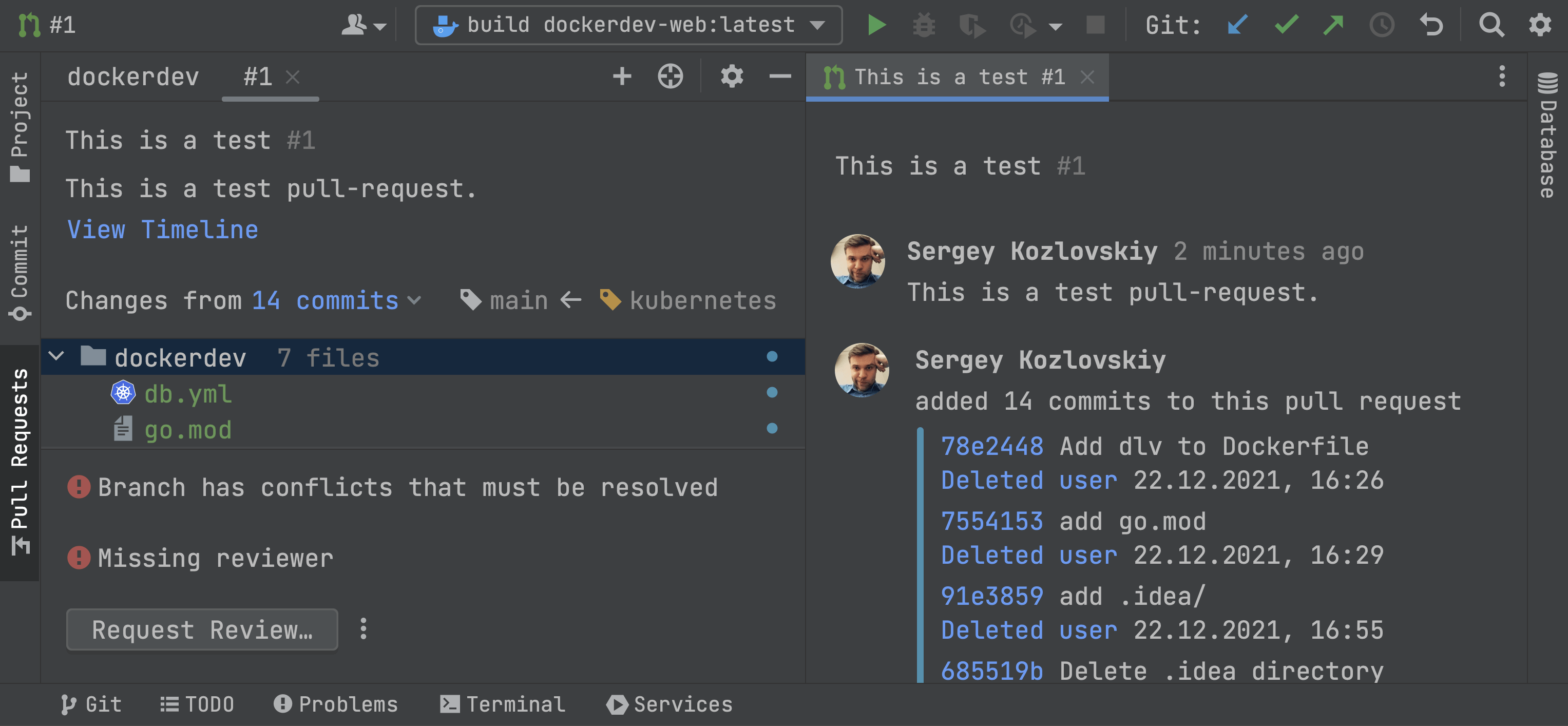 Improved code review workflow for GitHub
We’ve reworked the Pull Request tool window. It now features a dedicated
tab for each pull request you open. The tab instantly displays the list
of changed files but now provides less information than before. This allows
you to better focus on your current task. There is now also a dedicated button
to easily execute the action that’s considered the most important given the pull
request’s current state.
Web development
Improved code review workflow for GitHub
We’ve reworked the Pull Request tool window. It now features a dedicated
tab for each pull request you open. The tab instantly displays the list
of changed files but now provides less information than before. This allows
you to better focus on your current task. There is now also a dedicated button
to easily execute the action that’s considered the most important given the pull
request’s current state.
Web development
 Astro support
Astro support has landed in GoLand. You can get it through our new Astro
plugin that can be installed from Settings
| Plugins.
The plugin provides basic functionality, including syntax highlighting,
code completion with automatic imports, refactorings, navigation, correct formatting, and more.
Astro support
Astro support has landed in GoLand. You can get it through our new Astro
plugin that can be installed from Settings
| Plugins.
The plugin provides basic functionality, including syntax highlighting,
code completion with automatic imports, refactorings, navigation, correct formatting, and more.
 Automatic conversion of strings to template literals
GoLand will now automatically transform your single- or
double-quoted strings into template literals whenever you type .
This works for raw strings as well as for JSX properties.
Support for TypeScript in Vue template expressions
We’ve added TypeScript support in Vue templates
when you set the attribute in a tag to .
Previously, JavaScript was used regardless of the
attribute in the tag.
Note: to learn about all of the web development
improvements in the 2023.1 version,
head over to
the WebStorm What's New page.
Automatic conversion of strings to template literals
GoLand will now automatically transform your single- or
double-quoted strings into template literals whenever you type .
This works for raw strings as well as for JSX properties.
Support for TypeScript in Vue template expressions
We’ve added TypeScript support in Vue templates
when you set the attribute in a tag to .
Previously, JavaScript was used regardless of the
attribute in the tag.
Note: to learn about all of the web development
improvements in the 2023.1 version,
head over to
the WebStorm What's New page.

版权声明:本文内容由互联网用户自发贡献,该文观点仅代表作者本人。本站仅提供信息存储空间服务,不拥有所有权,不承担相关法律责任。如发现本站有涉嫌侵权/违法违规的内容, 请发送邮件至 举报,一经查实,本站将立刻删除。
如需转载请保留出处:https://daima100.com/n-goland-jh/4260.html